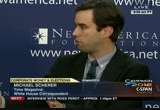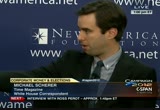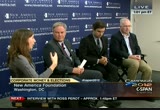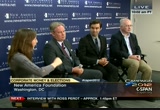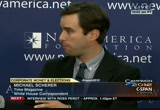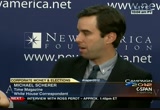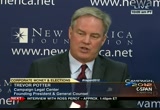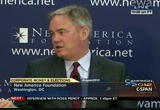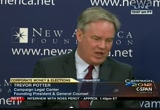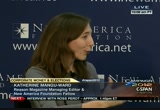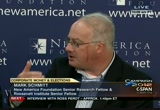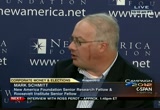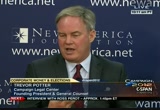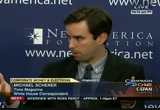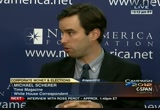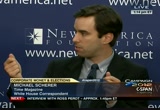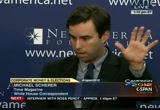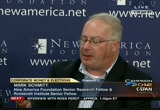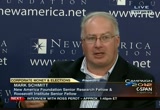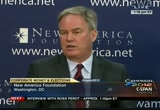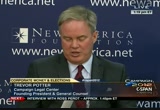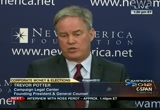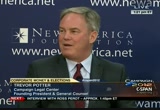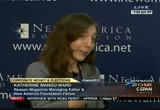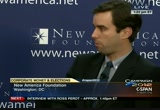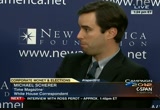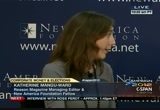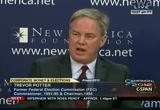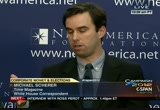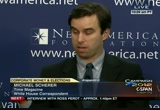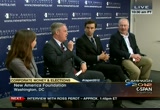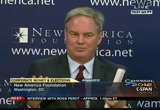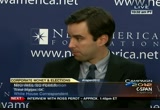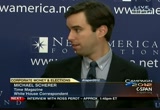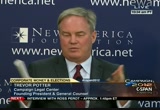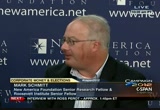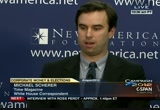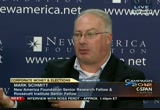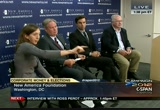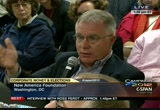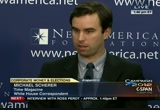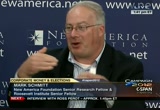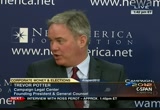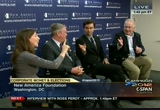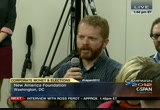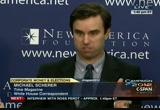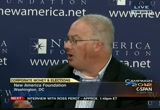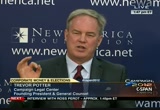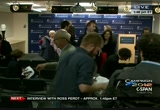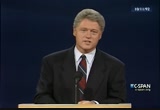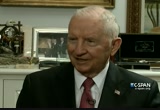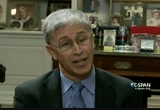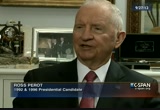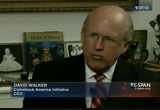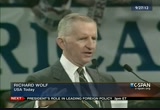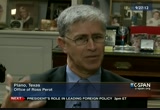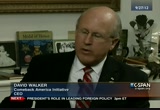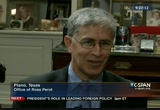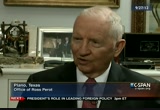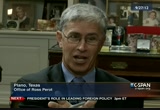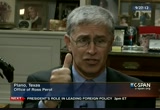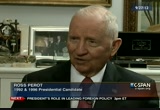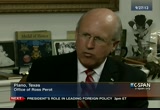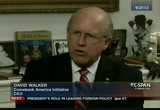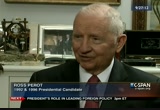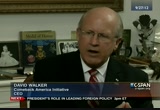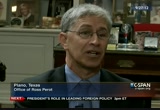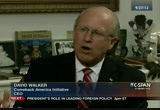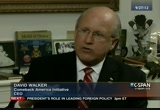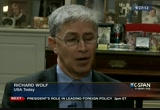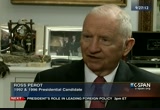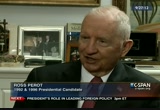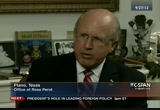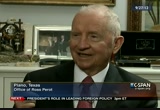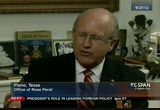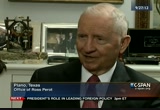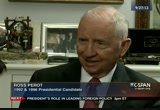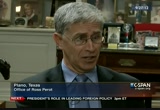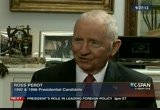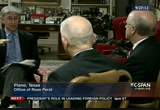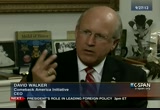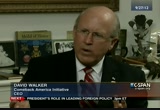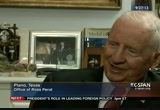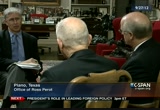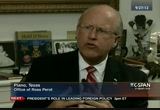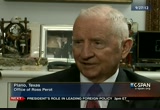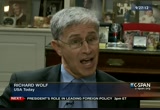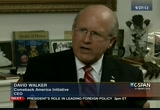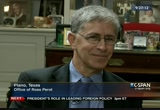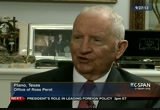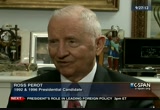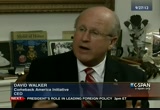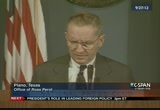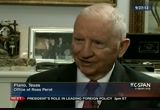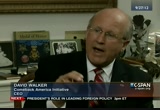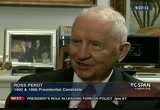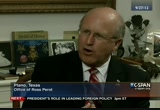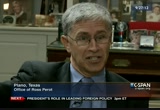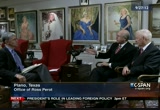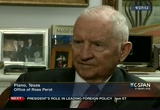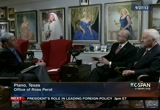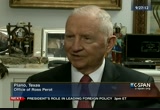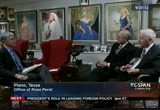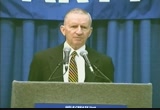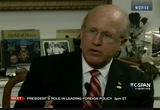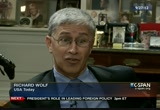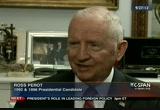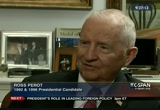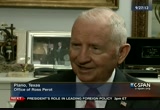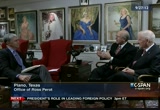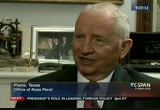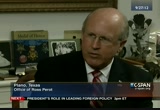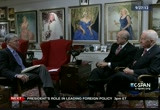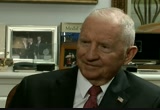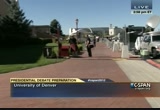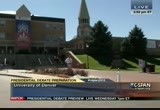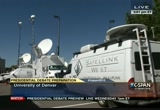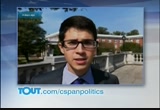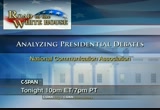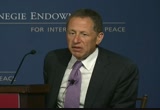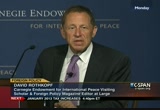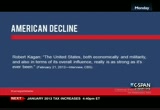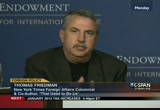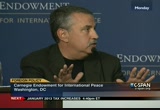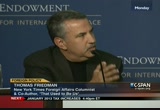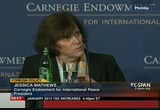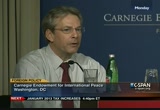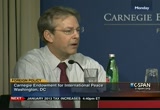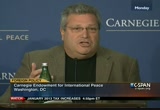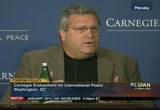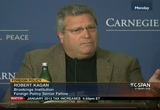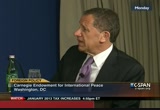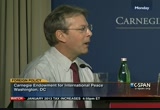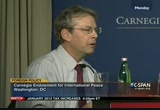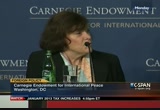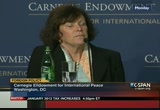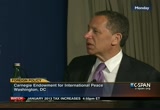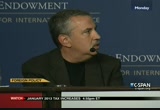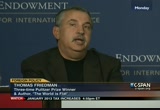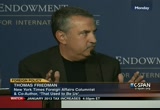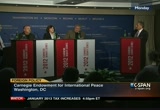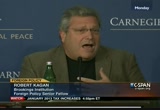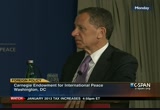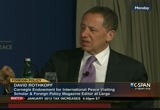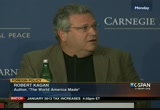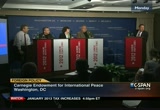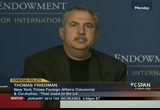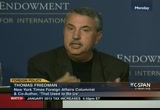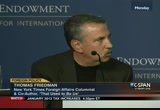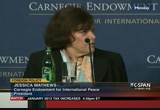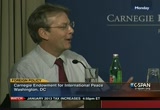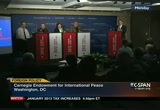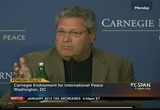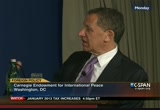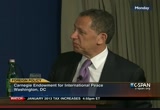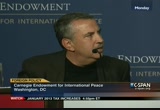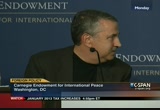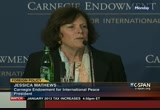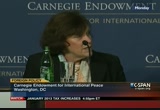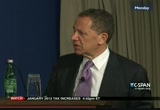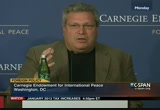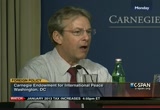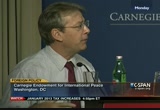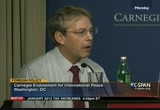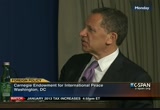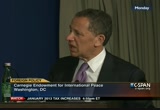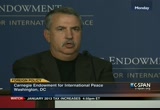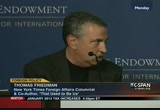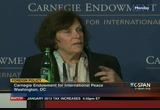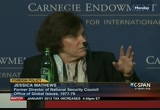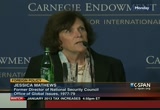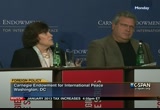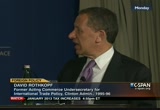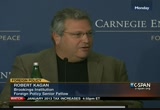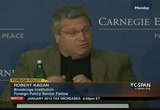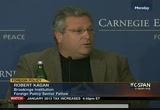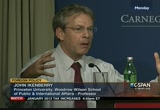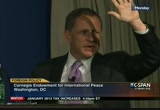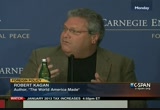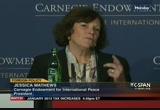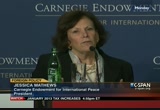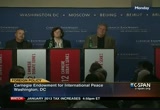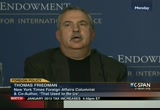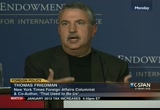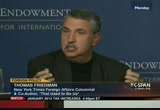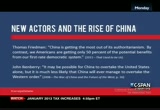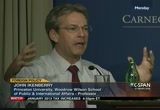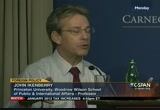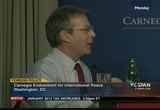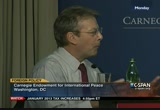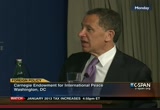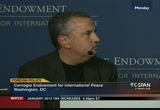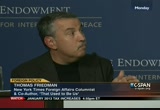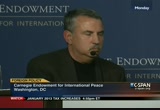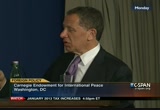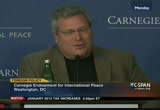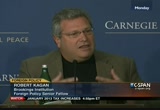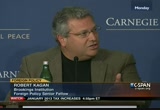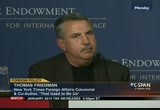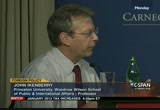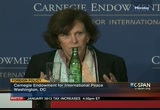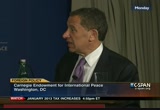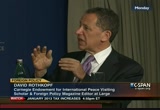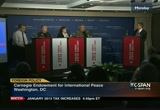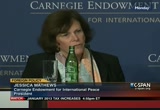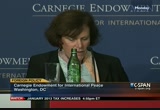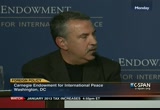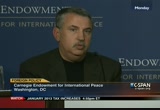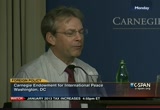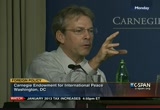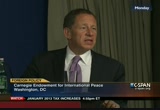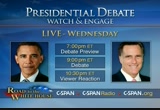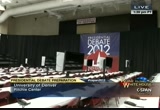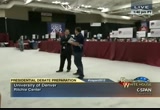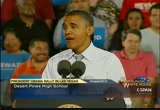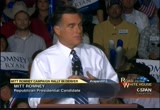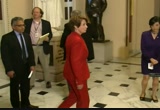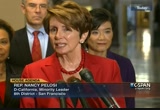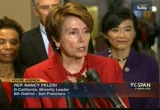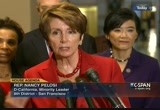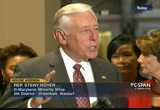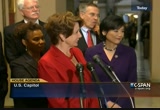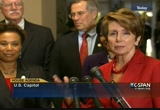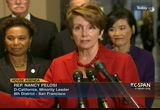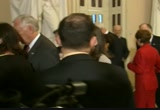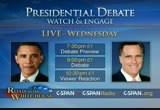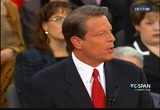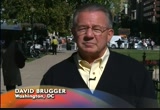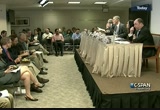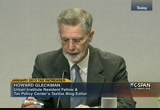tv U.S. House of Representatives CSPAN October 2, 2012 1:00pm-5:00pm EDT
1:00 pm
the first amendment but up this issue of corruption. they say we do not want officials being bribed. the real issue with the super pacs is that the majority opinions says as a statement of fact that if you are a third- party group like the super pac and you're giving money on your own without technical coordination, there is no corruption . . .
1:01 pm
either does something that is not in the interest of repaying that donor and if that happens, the esthetic beauty of that the lots of people chiming in on television as opposed to just one probably is less important. >> some of these big donors were in it for the ideology. they are not in it because they want a tax break.
1:02 pm
we will think that at least some of these guys who give money are just too forward their beliefs. maybe that is starry eyed. at least in some cases, this is really not about consideration. that is not to say that their beliefs to outline of what material considerations. it is a little harder to tell this story of corruption. you can still tell the story of influence. the point of giving money to a candidate somewhere along the line is to change the way policy is made in this country. that will never go away. what do we do with the guys saying i like certain policies and i want to see more of that. >> there was an interview recently where it was said that
1:03 pm
there's a possibility of federal investigations. he was convinced it obama wins, they will pursue these. >> why not use the real one? >> the real one has already been flogged to death. >> having spent time -- sometimes the press gets it wrong in assuming that every -- anybody who gives money is a bad person. that is the assumption of the narrative. big bad money people who are out to buy the election. the reality is is that there are desperate motivations and very different types of people. they are wealthy people and their careers are over and they don't want anything back even if
1:04 pm
they get a tax break, they don't care. from policies downpour -- from a legal standpoint, how you distinguish from the outset the one guy from the other guy? . there are certain philanthropic goals. there are also real business interests and there is personal interests. as a policy matter, i would not know how to say if you check the box, i am just in it for nothing there for you can give more money to the guy who works
1:05 pm
for the payday lender. they face huge regulatory barriers. mitt romney my promise that if he is elected, that will not go into effect. >> do you want to dive in? >> 100 years ago, the wall street trusts and elected theodore roosevelt because they thought he would not enforce the antitrust laws. that was ideological and they did not like william jennings bryan because they thought he was a socialist. they said if you want our thinking and the white house, we want somebody who sees things our way. the great line that came after that was that theodore roosevelt
1:06 pm
could not stay bought. theodore roosevelt said we should have public funding out of the treasury. if you look back at the supreme court in the citizens united case, you see a court that has two dare -- very different views over what is happening. we have your view which is a perfectly respectable view of the aspirations that there will these -- will be these independent groups speaking and saying what they want to say. it will be fully disclosed and it will not be corrupting independents. then you have the minority that caught the reality of most of the spending this year.
1:07 pm
their view was that this would be funded by giant corporations with specific legislative interests. that is why they will give so much money. it turns out it is not fully disclosed. it turns out it is not for individual candidates. it perhaps crosses the line to corruption. it is interesting when i talk about corporations, think of international oil companies when the majority took to the corporations, they talk about the corner hair dresser who happens to be incorporated. it is dependent on which end of the telescope you look through. in this election, we have seen samples of both. how do you write a law that covers both? ofi've never been accused being the one with the hopeful aspirational views.
1:08 pm
we have had this compelling explanation. of how hard it is to draw lines. what exactly is the difference between when i go in the ballot box and i both purely of my personal economic self-interest -- i might not want my taxes to go higher and this guy will make a lower -- why is that differed from someone who says i don't want the taxes of my corporation to be higher? all this sounds to me like an argument to stop trying to write these incredibly complex rules that people work around.
1:09 pm
what is the case for rules? >> let's say you have some hedge fund donor who lives in connecticut and gave a lot of money to obama in 2008. she is liberal, and environmentalists, all those things, and he has decided that obama is no good. he is still a donor. but don't really care about that. i found it quite shocking that governor romney in a speech took a set of positions about the middle east that will box him in in a way the candidates don't do that.
1:10 pm
it was a rather tight commitment that mitt romney made. i was troubled by that. i don't think it matters. you want to create a structure where elected officials are not wholly dependent or not largely dependent on a given donor. you want someone to be in a situation where the donor comes back and that really want a certain policy and a certain candidate can say get out of my office. that money is fundamentally important your campaign and then
1:11 pm
you have a problem. >> you can say this is complicated. under our system of government, the tie to go to congress. the of the one selected by the people and came up with what they thought was a law that would prevent corruption. five justices said no, we have a better way to do that. hen you car in the area of something that is as murky as this, the members of the legislature or the members of the court will have a better
1:12 pm
sense of what the dangers are of corruption and how to avoid them. >> maybe you can talk a little bit about where you see congress going on this issue? this is certainly something that congress will not let live forever. you also mentioned that there has always been money and it flows through the cracks and moves in mysterious ways. what is next on the national level? >> right now, it is not a bipartisan issue. in the near term, i don't imagine what will happen. there are fundamental forces in the election which allow that to ships. -- to shift. there is an idea that think the wealthy are treated differently
1:13 pm
than main street. main street appeals almost equally to activists on the left. that argues that that is your concern, the first step toward a constitutional amendment and getting supreme court justices restricted. we have a problem and the timing of disclosures. often, money will not -- people might know how money was spent. we have all is dark money does -- that is going for political ads. mitt romney has said in one of the republican debate that in
1:14 pm
his ideal future system the super pact would merge with his campaign. but he said there would be instant disclosure. my guess is that as the next place to go to. these days -- it is a dysfunctional body as soon as they are cashing the check, there's no reason that money cannot show up in a database or online from a group. that would be my guess where you go next. the other political thing will
1:15 pm
happen is that whatever the outcome of the election, democrats use this as a populist appeal. they say they are with the working guy. i think obama signals that he would pursue a constitutional amendment. did he said is not possible. he may go door-to-door on this. some polls suggest the eu would be lower by it used to be just an last few cycles, that that was it beauregard's -- a bar
1:16 pm
partisan rally. there is a potential for one party to take this as a baton. >> at the same time the bipartisan ground has disappeared, it has become a much bigger issue among democrats. senator find gold was a patsy to the democratic leadership. in many ways, that was a miracle. what you have now in the previous congress until 2010, led a majority of democrats supporting the fair elections
1:17 pm
now act. it is deeply imbedded at the highest levels. of the have not really seen that before. if democrats were to take back the house, potentially, you have a different political scenario. republicans would have to respond to that because -- in the past, that was a good thing but on the other hand, they know that they have mastered this system and i don't really a mess of it. i think the commission is stronger and it will be fascinating to keep people coming to congress who had experience of the state level system. i think you can see that when
1:18 pm
people had experience with the new republics finance office. they created a significant momentum. does the push for constitutional amendment help build it bomb i think it gets in the way. there are no steps along the way. you cannot do anything until you have a constitutional amendment. the equal rights amendment failed but it did not need to pass in order for a lot of good things to happen. >> if you go back and look at the congress 10 years ago when mccain-fine gold was passed, it was a tiberi different country. there was a great deal of commentary about congress becoming more polarized and more centered on the left and right.
1:19 pm
mccainearly 2000's, john carry 20% of the republican senate caucus formication/fine gold. it happened in the house because moderate republicans voted for it against their party leadership. those senators who voted for mccain- feingold are gone. the party has moved on and the ball. the ball. but there the 1990's were perennial discussions about changing the campaign of finance. it took place in the world or someone like the republican leader was interested in making sure each of the republicans got a good deal or not a bad deal but he is not opposed to reform or legislation.
1:20 pm
this is partially or largely because we have an fcc that is deadlocked at 3-3 because it takes four votes. that is a 2/3 requirement for the fcc to do anything. it is now as a prize of they don't. i think there really is a change in the way congress looks at this in a non-partisan way. i still hold out hope that after the election in the new congress that will at least take care of this of this closure. -- of this disclosure. they say the disclosure of
1:21 pm
advertising as well as election ads for campaign ads was constitutional. they went further and said it is a good thing. citizens should know who's paying for these ads. shareholders should know with their corporate structure to the eye injured of. that is what we don't have particularly women get to the eds paid for by these nonprofits. this rule in a disclosure of the lovers are. the supreme court has said it is a good thing and constitutional but you'll have a congress that has just going through an election with a lot of proposed money and may be a situation with the rest of this process by the actual trial.
1:22 pm
>> it is easy to disagree about the importance of disclosure. there is some value to non- anonymous gifts. do we know where every dollar comes from? if we're going to make exceptions, who gets those exceptions and why? traditionally, i am very happy to get special treatment of all kinds of all places. this is where we have made an exception by saying that we declare the large corporations to produce newspapers and
1:23 pm
magazines, they can say whatever they want. if we are talking about a world, where is the space for anonymous political speech? maybe the appropriate and -- into the is not a corporation. i think you're going to chime in. >> the best thing for getting more action -- watergate gave us the regulatory framework we have. there were foreign money scandals of the 1990's. there's a lag.
1:24 pm
assuming this regime continues, scandals will come up and raise the cost of this. i'm a journalist. i lean toward more information. the ability to have anonymous speech, i would want to weigh that value against corruption. my professional bias is to say this that is rotten to the core. there is no clear-cut answer. >> a don't understand what you
1:25 pm
think there is a bet you and someone being able to spend millions of dollars anonymously to run an ad saying someone is great or terrible. i understand the value of disclosure which prevents corruption and wish to put it in context. it was not clear that doing that for democracy is helpful. >> we won all used to be expected -- expressed in the political debate. i might be a rich guy who does not want to get involved or might be someone who genuinely fear for my personal safety or a might be someone who does not want my own reputation -- these are plenty of good reasons.
1:26 pm
>> they are reasons but i'm not sure they are good reasons. and we can use the cut to a party example but does not represent the land of the bridge. >> you have been to a bit different cocktail party. >> we will not open it up to people to ask questions. >> thanks for having the forum. can you talk about the implications of the super pak and the nonprofit, for the house and senate races and the state legislative races? >> the hot water of the super pak at the presidential level
1:27 pm
was in the primaries. the high water of the superpower in the general election is that the house and senate level. you're talking about literally billions of dollars being spent many super pak and make a difference but it will monday the dominant speaker. in a senate race, we have been seeing evidence they are coming in and spending tens of millions of dollars which point -- which may be more than the candidates themselves banned. -- themselves spend. that is where you see evidence of the danger of corruption. outside groups come in and knock someone off, they publicly declare them to be an enemy of their viewpoint. you go back to the next congress and say look what happened to so and so.
1:28 pm
we have seen that in both primaries. after elections those pacs have a great deal of credibility. because of the dominant position they can have, it helps their case that there is an accountability mechanism in politics from using falsehoods or making stuff up in ads were being unnecessarily mean in your as. it comes in the candidates, there is a reputation of cost. -- there is a reputation all costs. there was a conclusion that super pak adds are less mean on
1:29 pm
average. 1/3 of their ads include factual inaccuracies. their ads against newt gingrich which says he supported funds for abortion in china which was not true. his opponent can say i don't know why they ran that ad because it is not true. you have the real potential to move the smaller elections with false information. because it is coming from super back -- supertax, less accountability. you cannot blame directly on
1:30 pm
the -- on your opponent. we have seen some pretty slimy at coming out of these outside groups. >> tv stations can refuse ads. they cannot refuse ads from a candidate only from outside groups. they almost never do. potentially, someone can be sued for libel if they are not correct. >> you can go pretty far on someone's record and not incur libel. >> we're used to races where candidates are broadcasting at each other.
1:31 pm
there was press attention in the mccain campaign and-john mccain was being. we did a survey and 60% or less of the more negative. we said the obama people were more negative than mccain. he had so much money he to run negative ads as well as the positive ads. the candidates worried that they will be seen as too negative. they have a reputational risk at stake and there as. the super pak ads do not have the same risk. they and 99.9%-. negative.
1:32 pm
after the election, that is something i think we need to think about as an effect of this new kind -- campaign finance world is that the message the american people are getting -- >> another interest against anonymity -- it seems relatively small in comparison with the other issues. if you'll let one person to anonymously sully the debate in a significant way, there is a cost. >> if there is a widespread perception mitt romney does not have influence over what the
1:33 pm
super back contained, he will be expected to stand up and defend it. >> mitt romney said he did not see those ads. goshm, gewe - there are clear cases where candidates have come out against ads done "-- for supertax. -- for super packs. there is a burden on the candidate to publicly disavow things that are slimy and false. they have a direct effect. >> people worry about when campaigns are getting-, i said the accusation against jefferson which was that he was a hideous
1:34 pm
1:35 pm
states is increasingly the only advertising you read about in small-town newspapers. it is entirely negative, there is a lot more of it, how does that affect all whole election? >> there is a tough speech out there. -- there is a ton of speech out there. plenty of it is anonymous. >> let's go to be beardie. >> a group that has not been
1:36 pm
discussed in this conversation is political professionals, campaign operatives who benefit directly. to what extent are they benefiting from this money and does that present a hurdle to either a constitutional amendment or a movement to bring more transparency to the system? >> there is probably a committee for responsive hacks. >> these guys are making money on the amount of money that goes into the political space. i don't think it is the case -- several of the senior romney's strategists would rather have control of this money. other strategists have different interests. as a group, i don't think they
1:37 pm
1:38 pm
1:39 pm
you took a murky topic and made it clear. as the attorney of steven colbert, will he use that money to try to win the emmy from jon stewart? my real question is -- it is difficult to change. this is a time when things are so polarized. with new technology where everybody has their own axe to grind, address that as a dissuading factor. if i go home tonight, i can do whatever i want to as many people as i can reach. that is different from the time of jefferson. ben franklin are someone only
1:40 pm
needed to set that in print and now all you need to is to press a button. how does that fit into a campaign? >> obama cannot raise the money without technology. the net is different from a newspaper. you can say whatever you want an infinite number of people can read that. no one will know you wrote that unless you put money behind it or have a way of promoting it. there are similar barriers. you cannot say you're printing press is as important as someone else's printing press. it is more complicated. >> question surprised me. going to say we took a simple subject and made
1:41 pm
it murky. >> the person who will not read that article is the swing voter. the small donor psychology makes it possible -- we have gotten so many e-mails asking for $3. in 1994, no one asked for $3. it cost just as much if you got more or less money. you can go again and again and people can give what they want. it is brilliant at it has had a transformational power in making it worthwhile for candidates to
1:42 pm
seek smaller donors. solutions based on encouraging small donors are really the future. >> can you tell the story of why these small donors are ultimately good tax ? how is that better for democracy? >> it represents a border brace of support -- a border base of support. >> it is not changing people's boat. >> the candidate love to have small donors because they have invested their money even if it is $3. they are more likely to talk to their neighbors. they have made their investments. then the campaign as their e-
1:43 pm
mails and an urge them to get their neighbors to vote or they can volunteer. the answer for the campaign and of -- and democracy, john mccain used to talk about this, he said the problem is we have ended up with millions of dollars in ads being spent and nothing else. where are the people used to come to the barbeques and knock on doors? we what the volunteers. i think he is right. that's what you wanted a democracy is to engage electorates'. donating is part of that but it leads to these other things. you don't want a bunch of people who are days to -- dazed and stagger off to the polling places that they have not been disillusioned. >> one more question and beardie #2 has been patient. >> i want to ask a question
1:44 pm
about the difficulty of reporting on a system that has become so much more complicated in the last year's but especially in the last few years with more players and different rules and agencies. we seat 501c4's that are super pacs but i have talked to many journalists and they go into a five minute exploration and how do you say that in 30 seconds? how would you rate the media's reporting of this in general? how can it be improved. is it bound to always be lost in the market as of this other stuff? >>the super pac has a name that
1:45 pm
sounds supercool. if you say 5014c, you web already lost the audience. the media adopts these handles to make was very complicated explainable to the public in shorthand. before it was stealthpascs, the 527's or dark money. i agree that it is a huge problem. i think you would agree the agencies don't have their act together. given what technology can do, they could work better with the irs and congress created and same system of insane disclosure.
1:46 pm
we need groups like yours to do a lot of this, the work in between. we just have to keep trying. the bigger problem in the media is what we don't try to explain. it is not what we explain. the bigger problem is if you don't make clear that there are different rules and baker are complicated and some groups are very different. we know who their donors are and some we have no idea where their money came from. >> i think it has -- i think the media has been extraordinary in this cycle. the 501c4 story is
1:47 pm
unprecedented. they are supposed to be nonprofit. they are not intended to be used as political vehicles. no agency is prepared, the irs is not prepared to deal with this thing that has been there. it is a direct violation of what the tax law is. >> i agree, i think it is complicated. one reporter i talked to said my goal is not to mention 501c4 in my article.
1:48 pm
1:49 pm
tomorrow evening in denver at the university of denver and our coverage starts at 7:00 eastern on wednesday with a preview of the debate and it will be moderated by jim lehrer. the focus is on domestic policy and following the debate tomorrow, we will take your phone call reaction live here on cspan and cspan radio and c- span.org. c-span cameras are live on the ground today in denver inside the debate call at the ritchie center at the university of denver, we are staring at one of the television cameras that will be aimed at the podium and the debaters. sam stein of the huffington post covering the romney campaign this week tweets that mitt romney is enjoying a lunch at chipotle in denver. he had a burrito with black beans.
1:50 pm
that is an inside speak to the preparations for tomorrow night's debate. the president today is in henderson, nev. with last minute preparations. [no audio] [no audio] >> a look there on some of the network set up above the audience inside the ritchie center, the debate all at the university of denver where the debate will happen tomorrow night. the debate itself will start at 9:00 eastern and our preview
1:51 pm
coverage will be at 7:00. today the presidential candidates are on the road. paul ryan is in iowa and vice president joe biden is in north carolina speaking this afternoon in charlotte. our debatehub at c-span.org is wary confined a full schedule of the debates. -- is where you can find a full schedule of debates at c- span.org. there andtake a look that is our setup for speed -- cspan for tomorrow night. here's a look at the 1992 debate with george h. w. bush and bill clinton. >> ross gave a good answer but i have to respond directly to mr. bush. you the question my patriotism.
1:52 pm
you even brought some white ring congressman out of the war white house to attack me. i honor your service in world war two. i honor mr. perot's service in uniform and every other man and woman who ever served. when joe mccarthy went around this country attacking people's patriotism, he was wrong. a senator from connecticut stood up to him named prescott bush, your father was right to stand up to joe mccarthy and you were wrong to attack my patriotism. i was opposed the war but i love my country and in need a president that will bring this country together and not divided. i want to bake a unified country. [applause] >> i did not question the man's patriotism, i questioned his judgment and character. what he did in moscow was fine
1:53 pm
and he explained it and i excepted. i don't accept organizing demonstrations and a foreign country when your country is at war. i'm sorry, i cannot accept that. >> all of that debate is on our video library at c-span.org. you can check at our new debate hub/ ross perot was not part of that debate. here's part of the conversation, a recent conversation, cspan had with ross perot. >> we are here with ross perot sr. with an interview. how long has it been since you have come back into the public eye and address these issues? >> i have made a number of comments about the national debt and the problems that face our country and the need to get those problems straightened out now.
1:54 pm
interviews he has given recently. >> i have been in the public eye economy and the need to get those problems straightened out. commanded the public attention issues? to judge that. what i can say is we need to describe what has happened and what is happening and what we need to do to get this under control, and right now, everybody is dancing around it and ducking as opposed to facing it, and if you have got cancer, the first thing you want to do is face it, right? we have got economic cancer at this point. we have got to fix it. >> that was the case in 1992 when you ran your first presidential campaign, and it was still the case when you ran your second in 1996. there was progress after that. a lot of people say that because of the campaigns you ran, we had surpluses and fought our way out of this, and now, it is worse than it was 20 years ago.
1:55 pm
>> exactly. >> how did we lose our way, compared to the late 1990's, when we fought our way out of this debt, to where we have gone from $4 trillion in debt when you were running to at $16 trillion? >> i am glad you mentioned that number. that is so big, and i hope you explain to the american people how big it is. it is going to have a horrible impact on us and future generations if we do not deal with it now and get it taken care of. if you have cancer, you do not wait until it is over your entire body. then, it is too late to fix it. all of these things that are coming out now, to diagnose the problem, explain the problem, and hopefully we will get our people in politics, in the house and senate and white
1:56 pm
house, to deal intelligently with the problem. >> back in 1992, when mr. perot ran, he ran on declining trust in government and confidence in the future and more. the truth is, we are in much worse shape on all four of those issues than we were in 1992, just looking at the objective facts. george h.w. bush, 41, and william jefferson clinton, in part because of the work that ross perot did in making this very clear, simple, and compelling, made these issues a higher priority and did several things. one, imposed tough budget controls. two, did not expand entitlement benefits, and three, unchanged
1:57 pm
taxes when they saw they were irresponsible. president george walker bush, 43, and obama have done exactly the opposite. president bush 43, his term is over. president obama could change course. whoever is president needs to change course, because if we do not, the problems in europe could happen here. >> we will go through that period of time and talk about some of the issues of 9/11 and the wars and the tax cuts and the recession of 2008, but let me take you back to 1992 first. what caused you at the time, because it will be relevant, what caused you to leave a very comfortable life, two businesses that you had founded and had done very well and that you had passed on, or one of them that you had passed on, what caused you to jump into
1:58 pm
presidential politics then? >> every generation in history has worked and sacrificed to lead a better country to their children and grandchildren and future generations. we are spending their money. we are now even much more spending their money, and we are leaving them a mess that will be very difficult to deal with, and if we are in that week, just think of who will want to take us over, and the last thing i ever want to see is to see our country taken over because we are so financially weak that we cannot do anything, and we are moving in that direction. >> so you are thinking of countries that are buying our debts. >> we fought all over the world in world war i and world war ii. how long have we been --
1:59 pm
>> 11 years in afghanistan. >> 11 years, and it is just getting worse, so we have got to wake up and get the right thing done for our country and our children and our future and make sure we leave a better, stronger country for future generations. >> but you believe in your first campaign that what you did, although you ended up coming in third, 19% as a third-party candidacy, do you believe that you had an impact on solving the deficit and our debt picture in the 1990's? things improved
2:00 pm
>> i do not want to take credit for it, but i am pleased there is a breathing period where we are going in the right direction. now we have heard it around and it is going through the roof and is inexcusable. what is interesting is that hardly ever gets discussed, and in the papers, on the media, you would think this is front- page news. it is not. >> absolutely no question that his candidacy caused president clinton to make fiscal responsibility and much higher priority. no question. clinton will tell you that. people in his administration will tell you that. he made the difference even though he did not win. the polls will also tell you in july he was leading. in addition, the exit polls will tell you that the people who voted, if they thought they
2:01 pm
could have won, they would have voted for him and he would have won. much worse today than we were then, and people know it. >> do you think we're much worse today because he was not elected? >> we have lost our way. >> that is history. we're on the edge of the cliff, and we have got to start fixing it now. otherwise we are leaving a disaster to our children and grandchildren and we could even lose our country. if we do not get fixed -- and nobody is talking about what we have to do and why we have to do it. they would prefer not to have it discussed. >> what is happening is we're still coming out of recession, so both candidates, and as president for four years, are using the necessity to dig out from recession before they get to austerity.
2:02 pm
you could argue that in europe they have tried austerity before the ink out of recession, and that did not do so much good in europe. >> if i told you i do not want to dig out a bite that problem until i go broke, you could say, what are you talking about? that is what you said. you're not on to pay your debt if he did not have the money. if things are going downhill and you are running toward that up, you'd make it next to impossible to paint your debt. we need to put on the brakes now. it can be done if we and the house and senate and white house have the will. they should have the full support of the american people to get it done. >> you cannot dig out of a whole, and that is what they are doing. you have to climb out of a
2:03 pm
whole. in reality we face two problems. we have short-term economic challenges because we have very weak economic growth. we have high unemployment, higher underemployment, and the numbers are higher than the government tells you. we need to do something about it. it has to be coupled with a clear, credible, concrete, and enforceable plan to deal with the structural deficit lying ahead. you need to do both. that is the only thing that makes any sense. it is the only thing that makes sense from the standpoint of politics. >> you spoke in 1992 about the campaign, your plan sounded then a lot like some of these bowls simpson's balanced-type plants that are coming out now. you did some of everything.
2:04 pm
you did not leave out sacred cows. the one that higher taxes, higher gasoline taxes, you wanted the wealthy to pay more weather in higher taxes or not taking entitlements. do you find that willingness to day on the part of candidates to hit all the sacred cows? >> i do not see anybody doing it, do you? if somebody is doing it, i am missing it. i thought they would hope this go away and they could run on all these things when you are talking on the television. >> would it take candidate saying you'd need to do all those things, not just going after entitlements cut domestic spending, defense, but also to raise taxes? you need to do all those things, do you feel? >> we need to do whatever it
2:05 pm
takes to solve this problem, and that probably takes all of these things. overall, you have to deal with this whole problem, and is once you have cancer, just living in denial, which is the best way to describe how we are living now, it gets worse, and that is happening every day. if you look at these charts that we have distributed over the country, and people going from city to city, talking directly, and i can hear in my home town they will be talking in the next few days, directly to the people, and we need to get the american people alive and alert, because the typical person running for office is gone to do what ever it takes to get their vote. i do not think he has any sense at all that they want this fixed.
2:06 pm
if we have that at the grass- roots level, he would have these people with different personalities, being reborn, and they would be out on the campaign trail. >> both parties are responsible for our current problems. >> yes. >> governments have lost control of budget, and has waited too long to restructure, but it is not too late. the american people are smarter than most politicians realize. they know we are in trouble. they're willing to accept tough choices as long as they want it to be part of a comprehensive plan that they deemed to be fair. overwhelming support for comprehensive reforms in a range of areas where everything is on the table, minimum support, 76%, up to 100%, based on six key principles that it virtually unanimous support. the president is the chief
2:07 pm
executive officer of the united states. whoever the next president is, they need to demonstrate extraordinary presidential leadership. they need to use the power of the presidency to go to the american people, as ross perot did in 1992, to build a case that we are on a burning platform, to help them understand that everything has to be on the table, to provide principles and a framework for action, and to call the first three words of the constitution "we the people" to work with the president to solve the problem, because if you do not keep the economy strong, everything will suffer over time -- job opportunities, domestic tranquility. >> did you feel in 1992 and
2:08 pm
1996, that we can get out of our deficits, and we ran four years of surpluses, prior to 9/11 and other things that happened in the last decade. did you think we had solved our problems? >> no, we were just lucky where weaver going through a good time. now we are any time of bad luck. i would really impressed if our president would take this issue right now and explain to the american people what he is going to do, because obviously his opponents would have to get busy, too, right? right now is like one of these things. you do not want to talk about it. >> one of the things i remember
2:09 pm
about my testimony is when i was comptroller general, was in 2001, when we had a surplus, it was burning a hole in congress' pocket, and they had 16,000 ways to spend the money, either directly or through tax rebates, and i reminded them that the surpluses that were projected by the congressional budget office was just that. they were projections. they may or may not occur. we had $20 trillion worth of liabilities and unfunded obligations that were not been accounted for. we had known demographic trends that were going to bring us back to that in the future. today that $20 trillion is $70 trillion and growing by $10 million a minute. thinks happened totally out of control, especially since 2003. >> let's talk about a couple solutions out there. what has gotten worse of the
2:10 pm
last 20 years is this issue of tax expenditures, tax breaks, for your more courage, for your employer-paid health insurance. i think that the bowles-6 in commission said it was a $1 trillion problem. give us ideas as to what is doable there, because the big tax breaks are those that millions of americans rely on. can those be reduced substantially? >> i do not know. i am not smart enough to know. if i were, i would tell you. >> i mean politically. if you were in office today -- >> would you say don't charge as much as you are charging today? >> we are taking this issue head on, and what we are saying is broaden the tax base so
2:11 pm
eliminate deductions, exclusions, credits come on the individual and corporate sides, lower the top marginal rate, and i will give you four examples of preferences that would be eliminated or change. one, phase out the individual income tax exclusion for health care. it ought to be taxed as compensation. we need to phase it out. secondly, charitable contributions. full deduction for charitable contributions because government has grown too big, waited too long to restructure. the charitable sector will become more important.
2:12 pm
mortgage interest deduction, two houses or one, one house is a need. one home, deduct maximal interest. thirdly, have some type of reasonable limits for retirement savings, but have tougher controls that locked up the money for that, disability, and retirement. those get overwhelming support. by the boy, if you can end up reducing the top marginal tax rate, down to 25%, you can eliminate the difference between capital gains and ordinary income without having adverse effects on the economy. that will increase the effective tax rate of people who are well off at the same point in time making it a simpler system. right now we have 46.4% of americans who do not pay any income tax at all. the poverty rate is 15.9%. i do not know what the right
2:13 pm
number is for people who should not have to pay income tax, but the income taxes from all the constitutional roles of the federal government -- you cannot have 46% getting a free ride, and the people understand that and support that change as well. let's debate what that number is. it is lower than 46%, but we need to have a progressive system. >> one of the things that has changed since 1992 is baby boomers were moving toward their retirement. now they are into it. we have the baby-boom generation, when birthrates are at their high estimates are in their mid 60's, started taking social security a few years ago at 62. now they are starting to take medicare. what does that mean to you in general, that we will go through 20 or 30 years of those people moving through the years of their lives when they are entitled to social security,
2:14 pm
medicare, and other things? what does that mean in terms of your grandchildren's generation? >> we need to start correcting all of that now and not let it continue. it may occur for a while the matter but i do, but the sooner we start correcting it, the sooner we get that out of the way. we do not do anything. the point is we are in denial. we need to get out of denial and focus on what we need to do and do it and keep the american people fully informed every step of the way so they know why we did this and what we did that and so on and so forth. but them feel they know they are directly involved, because we're trying to get their money. >> it is a matter of public education, and that is where groups like dave's and other organizations that are trying to beat the drums to get americans to understand what is
2:15 pm
going on, is that what you feel is most important, educational? >> the first thing, in our country, if i had three wishes -- a strong, moral, ethical base. i had that growing up in the depression. a strong family unit in every home. now the divorce rate is over 50%, right? that is destabilizing. when i grew up in the depression of all times, we had the finest public schools in the world and the one thing a democracy must have is a well- educated population. our public schools are at the bottom of the industrialized world. that is the country. the great state of texas, where i went to schools and had an incredible education, is either 47 or 40 night in the 50 states. that is all our responsibility
2:16 pm
and we can correct that, but with these problems we face now, that is so fundamental about what we must do now, and we cannot pass that off to a house or senate or the state or the federal government. we have to do a lot of that by being involved. >> if you look at our fiscal issues, and if you look at the dimensions of it, it is not just economic. we are mortgaging the future of our children and grandchildren at record rates, while we are reducing investment in their future at the time that they are going to face and a lot tougher competition in an increasingly interdependent world. that is irresponsible, and ethical, immoral, and it must stop. at the same point in time, how you solve this problem involves important economic, ethical, and moral questions as well. we have to recognize that reality.
2:17 pm
the clock is ticking. the fuse has been lit. time is not working in our favor, and we better start making progress, and we better get a good fiscal bargained in 2013 or what that is happening in europe can happen here. >> let me give you an example. go to our most elite engineering schools. at one time we had more talented engineers than anybody else. we were discovering everything in the world, producing it here. now that has all turned around. it is getting worse by the day. 78% of the people getting ph.d.'s from elite engineering schools either come from china or india, ok? now, 20% come from all over the world. i am up to 98%. that means 2% of the people getting ph.d.'s are coming from
2:18 pm
the united states, in our most complete engineering schools. that is a recipe for disaster. we do not ever talk about it. thingjust letting the unraveled. what about best new engineering schools, which you will be hearing about in a few days, in dallas, and they have a great school, but guess what -- i asked them onetime how many people they have from china, and this university right here, 2000, added to the top. >> this is an example of how we need to modernize our immigration policy and how we need to change education policy alice well. immigration policy is based on family relationships. it is not based on economic considerations, skills and knowledge. while we need to revitalize education for americans, we need to recognize the extent to which people are coming to america to learn we need to do what we need to do to keep them in america.
2:19 pm
>> this is our core problem. there trillions of connections in the brain called neurons. they start down at age 6 when they start public school. kids at a school soared like eagles, got college scholarships, they got wired. when you know this and you do not talk about it and do not do anything about it, this is another recipe for disaster. our public education system is just really got to be strained out. the teachers' unions are primarily concerned about how much they make a year, and that is not where the concern has to be. it is making sure that children have the funds in education that are needed for education. >> we spend double per person to
2:20 pm
educate k through 12, double other nations. we do the same thing in health care. we get below-average results. when you get below-average results, the answer is not to throw more money at the system. it is to read engineer the system. during more money at a system that is getting those kinds of results is called in sanity. >> it is all about politics. the teachers' unions give money to the guide that is going to take care of them. are you with me? when you look at the chinese and see how bright they are, and they have a huge population, 1.2 billion.
2:21 pm
that is a giant population. we have 310 million. the sheer size of their population, it is interesting they are getting the best- educated people because of a number of symbols you have to learn about all these other things, and we know what we have to do. we just do not do it. my advice would be, if i have an opportunity, let's quit talking about it and just do it. >> you had said when you were comptroller general tried to call attention to this problem, the problem of running deficits and accumulating greater debt, that the country had a budget deficit, a trade deficit, a balance of payments deficit, and the fourth one you brought up was a leadership deficit.
2:22 pm
>> leadership is the greatest. >> can i ask you both, describe what is the problem with what appears to be in your mind a leadership deficit, that we're not getting the leadership on this key issue either from this president or past presidents, this congress or pass congresses/ what does it take to get elected officials to tackle at an issue, increasing their taxes? >> let's start with the families. they will get their attention. the voters have to understand all this, which they did not, and voters need to understand what we have to do to get all this corrected, and they do not. if we ever get that over to the voters, they will vote for the people who are geared up, ready, and know how to do it and are running on that basis, and then we can change this country forever and get us back to where we used to be when i was a boy in the depression.
2:23 pm
why schoolteachers and would have been doctors, lawyers, indian chiefs today. with luck they were making $200 a month, but they were talented, they brought out the best in all of us. they were by example really fine people, and with the highest qualities. all that got transmitted to the children at class a even if they were not getting it at home. >> when you were running you were talking about increasing not necessarily dollars per capita, but investing in education, communications, and transportation. even while trying to reduce deficits and debt, you were talking about the need for certain targeted investments. do you feel that is still true today? >> all you have to do is to look at it and see that it is true today.
2:24 pm
as long as that goes on, kids are lost. >> we need short-term investments, but they need to be properly designed and the effect of the implemented. recent ones have not banned, but they have to be coupled with the concrete and forcible plan to deal with such structural to facets. we need policy reforms, operational reforms, and we need political reforms. on the political side, our country today is dominated by special interests, by the duopoly of political policies, and toward politicians who may or may not have had a real job in their lives, but once elected, they want to keep it. congress works three days a
2:25 pm
week, and it does not work that many days any year. it does not get paid for performance. if it did, it would owe us money. we need to have redistricting reform, integrated and open primaries, campaign finance reform, and we need to have term limits, 12- to 18-year term limits. the fuse has been lit. what we need is two things -- extraordinary leadership from the president of the united states, whoever that is. we need these debates to be more specific, substantive, on these issues so the people can make an informed judgment about who to support and so that whoever wins will have a mandate to act, and then they need to lead. the president is not just the commander in chief. the chief executive officer of united states. this country is in terrible
2:26 pm
condition and we are losing ground every day. >> they are not doing anything. >> dave mentioned duopoly. established a third party, united we stand and the reform party. do you feel that is needed today, that there is something wrong with that two-party system which has gotten more acrimonious, each party back on their 10-yard line? >> any way that can be done, it is almost impossible to do it. it would be a very healthy thing if you could get it done and make it happen, but it is very difficult to do and very few people would want to try to put it there, because they know they are going to be butchered from day one. much of the media will participate actively in that.
2:27 pm
you have to talk about the politicians. the media has strong views. >> it is hard to get somebody like dave walker willing to put their name out there and run in 50 states and withstand the media scrutiny and the like? >> if you ran for either party, it would be all right. if he created a new party, that would be very difficult. i can promise you, because have a huge number of special interests hammering away. >> also, when you did it, you put tens of billions of dollars of your own money into it. today it would take hundreds of millions of dollars of your own money. i wonder whether anyone -- do you think if you were a 62-year- old man today, could you replicate in today's politics with unlimited spending by corporations and unions, could you replicate what you did then
2:28 pm
at the dollar level? >> if you got the dollars, but you could not get the open- minded look at what you are doing as opposed to everybody at attacking the fact that you are even trying. that is the way things have been, the way things are, and how can you change that? i do not know. if i knew, i of would certainly tell you. >> finance reform. >> we have got to get a clean up. >> there is nothing to prevent the congress and the president today from passing a law that would require full and timely disclosure of contributions to these superpacs and others. the supreme court scission did not do that. they are working for themselves and their party. what we need is campaign finance reform.
2:29 pm
i will give you a simple principle, that the people who can contribute directly or indirectly are people who can vote. news flash -- corporations and unions cannot vote. it is a simple principle, one of the ones we are exposing to the public, and they overwhelmingly endorsed it. most of these areas -- it is very common sense. that is what the american people respond to. that is not how our politicians treat us. that is part of the problem. >> don't you think it is interesting in all of these really tough times, we have talked all about these big numbers, that the house, the sense, and the white house did not reduce their salaries? think about it. >> do you think they should? >> if you were in business, you
2:30 pm
would have to. they need to set the first example of making the cut back for themselves. >> leading by example. >> exactly. >> it is a fundamental principle, especially in business. we need more of that. >> how close do you think we are to a crisis? people say the deficit and debt issue will get resolved when they have to resolve a, not when they should resolve it. do you think we're close to a market crisis? to bond buyers of not investing in the united states' debt -- will that happen one of these years? >> of course. it is as common sense. we're not talking about politicians, where talking about people taking money out of their pocket at one time,
2:31 pm
considering it was the safest investment could make, a treasury bill, right? and now i have every reason to be concerned whether it will last or how long. >> we are living in a dream world right now. there is no such thing as an entitlement. the supreme court said there are two things that under the constitution, are guaranteed. number one, military pensions, and, number two, bond holders of u.s. debt. the u.s. will not default on its sovereign debt, but there is a huge interest rate risk, and if you are a foreign investor, there's a huge currency risk in investing in. all the new debt in the last two years has been purchased by the federal reserve, up 70% of that, we are self-dealing in our and debt. we did not have market rates. we have artificially low rates. china, japan, opec nations,
2:32 pm
because they have positive trade values, but if they buy a 30-year bond? no, they are buying short term, because we have historically low interest rates, the lowest maturity in history, and when the interest rates go up, for everyone% increase, it is $160 billion a year in new spending for which we get shinola -- nothing. and now up to 5% below average interest rates. >> isn't it interesting that not more people talk about it on television, and the candidate do not spend much time talking about this. it is just like being in denial. >> we did not go through the
2:33 pm
decade of george w. bush and the last four years of rock obama, but what they have had to deal with, in fairness, is 9/11, a couple of wars that require a lot of spending, the tax cuts of george bush -- i am not sure where you stood on those, but they did eat into the amount of money we had to spend -- and then the recession, which was some say close to a depression. did that time prevent us from being able to make deficits and debt a top priority? >> it should not have. it could have, but it should not have come out if people were thinking clearly, if they were well educated, if they even understood this whole damn thing, which they do not. if you say what percentage of the american people understand this, i would say it is a very low number. it to be everybody, and everybody should say this is my country.
2:34 pm
people should be very active about not letting anything damaged our country. the one thing we have not mentioned at all, there is no question at all in my mind, if we keep going this way, some nation is going to head over here to take us. if they did, they have picked the right time, right? i wish every american with the about that, all day, every day, saying we cannot let that happen. we have the greatest country, we have got to get it back there, and we need to keep it there and make it better, not worse. that should be our goal. every year we should look back and say things have gotten a lot better, even after our ideal. we want to still make it better. >> used a word that is commonly used, that the same problem.
2:35 pm
it is called war. we have not declared war since world war ii. we are not following the constitution of the united states. in 2003, things really spun out of control fiscally. three things happened. they were irresponsible individual, collectively they were reprehensible. the second round of tax cuts. secondly, invaded a sovereign nation without declaring war and without paying for it, called iraq. thirdly, medicare prescription drugs was expanded, added $8 trillion in new unfunded sees when medicare was already underfunded $20 trillion. since then we have stimulus programs that are not properly designed and the effectively
2:36 pm
implemented. we passed for will care act to cover 30 million more people. government today is 24% of the economy, 12 times bigger than 100 years ago, and it is headed to 37% on autopilot. these people live in a dream world. >> let me read you two quotes. democrats and republicans blame each other. nobody steps up to the plate and accept responsibility for anything. this city, washington, d.c., we're giving a national press club speech from this city has become a town of media stunt man who posture, creek images, talk, she got off roman candles, but do not accomplish anything. i am wondering if you think you
2:37 pm
could utter them today in 2012 and they would make just as much sense? has anything improved in the dealings of republicans, democrats, white house, congress -- >> we still have the same problems. that is why everything is going downhill, and that is what we have to correct it. like a guy drinking, sooner or later he has got to put a cork in the bottle. he is in denial. it is not that serious, it is not that serious. you have to have the will to do it, and i have said if you had the will as a nation, not congress, not the ordinary -- if the ordinary citizen had that will and could not be jerked around the way we try to manipulate him, we would get this all straightened out. >> there is no question that we are worse today than we were in 1992.
2:38 pm
washington has total gridlock. the american people are not disheartened. they are disgusted. they are disgusted with that lack of progress on a long list of growing problems, energy problems, environmental problems. our health-care system, our tax system. our regulatory policies. washington has taken another five-week vacation. it took a five-week vacation in august, worked two weeks, taking another five-week vacation. if these people did a better job, they would not have to take some much time off to campaign, raising money, because if they did a good job, people will reward you. when you do not do a good job, you have to spend a lot more time doing that. >> do you think we would be better off with a parliamentary system, where one party to control things for a time, and we did not have to deal with a
2:39 pm
republican house, a senate of democrats, so we are always at this gridlock? we kind of let the supreme court make the decision because the politicians cannot do it. >> we need to work at bath, but i have no idea how, because as you know, that is the way it is. it is human nature to maintain the status quo until the things get terrible. then people get flexible. that is the worst time to solve the problem. the best time to solve a problem is when your temperature goes up when the great. he did not wait until it has gone up 20 degrees and realized i have something we cannot fix. that is the same problem in our country. we keep putting it off. the media is participating in this, not trying to discipline
2:40 pm
it in any way, because it is all news, not good news, but they keep people they're sitting the television. that is not enough. what we do, and i would again one more time say if we do not get the strain that, somebody will take us, and that is the last thing any of us want, and i will keep saying that until, hopefully the nation or somebody say we will not let that happen. >> on the parliamentarian system, that would take a constitutional change. the party that controls the parliament also controls government, and then you have more of an ability to get things done. but you also have fewer checks and balances. other countries basis in problems we're talking about in the 1990's. they happen to be parliamentarians systems, but you have to have public
2:41 pm
education and engagement, extraordinary leadership from the president, and you have to have the first three words of the constitution come alive -- "we the people" -- to work with the president, the house, and the senate, to take control. if they do not, throw them out. >> we have had some times since 1992 when we had an uprising. some people give you credit for the republican revolution of 1994, because it was the republicans under newt gingrich who adopted a lot of your tactics and positions. then it was recently we had tea party movement. that was a movement within a political party.
2:42 pm
do you think it takes that kind of a movement? i am wondering what your thoughts were when the tea party revolution rose up in 2009? >> interesting to see that happen. i was surprised. it has had an interesting impact, don't you think? >> yes, interesting. >> not the solution, but it was a healthy thing to happen. >> that shows that average americans are -- >> it wakes up a lot of american citizens. >> my personal view is that he party and the occupy movement had a lot in common. because they are both concerned with a lack of integrity and accountability. in the case of the tea party, they are concerned with the lack of accountability in government. in the case of occupy, it's
2:43 pm
wall street, and guess what -- they are both right. >> he summed it up beautifully. >> when you were running, it was a matter of people getting to call into an 800-number. now we're into this world of social media, where you can tweet something out in a matter of seconds. do you think that would make a third-party iran or any kind of a people's movement easier today than it was 20 years ago when you had to rely on people calling in to a phone number? do you think the computer revolution, which you have been involved since the start, and in particular at the social media revolution of the last veral years, should create a situation where you are on twitter, where you can mobilize
2:44 pm
people more easily? >> sure. >> shouldn't that make the type of solution you are talking about, people demanding change, similar to have? >> that is what we need, and i think that is a good way to do it. >> the problem would be they have the tools today to instantly to mobilize. you are saying they do not have the education to know in which direction to go? they're not being educated about the degree of the problem in terms of how deeply into annual deficits and debt we are? >> absolutely no question that social networking, facebook, twitter, provide an opportunity to reach a lot more people a lot quicker than was in the case in 1992.
2:45 pm
>> i know you are writing a book. your autobiography coming out in a few months. why now? >> people wanted me to do it, so i agreed, and people -- and it will be coming out shortly. it is all about these things we have talked about today, as well as other things. i hope it will be useful for the people to get informed and understand that we the people own this country, and we the people have any responsibility to get these things straightened out. and leave our children and grandchildren a much better nation rather than just letting it fall apart. it also helps to have the best public schools in the world, which we did not have any more. it will take a while paired
2:46 pm
right now, it is important to try to make sure we get all of our people actively involved in understanding these problems. included in the book is an updated set of charts that show all of the fiscal problems of our country. you get that free with a book. they fit into the book. thaty don't you show them beautiful cover? >> i do not know where it is. >> i can grab it right here. >> this is the book coming out, and it will be coming out here pretty soon, but i hope it will be useful to the american people to understand how important they are to the future of this country, and we the people can determine who are leaders are, and we the people must select the right leaders. once we have them in office,
2:47 pm
keep in close contact with them, so they do not wandering around to special interests. >> you have had a remarkable life, and you have been involved not only in your businesses, but in terms of being p.o.w.'s back from overseas, your involvement in public education. since we're focusing in this he interviewed on their presidential campaigns and the issues of deficit and debt, where do you make that portion of your life in terms of your legacy, in terms of your achievement? how do you look at that time when you decided annual deficits and accumulated debt or important enough you would put your name out there and run in all 50 states? >> i did not get done what i wanted to do. that has not happened yet, and this is my last big effort here.
2:48 pm
this will cover it again. >> do you agree, dave, that you think he is being too humble? >> he is being very modest. he is the biggest philanthropist in the united states that people did not know about because he does most things anonymously. he is a perfect example of when he ran in 1992, he was running to make a difference. he put his own money out there, he made the difference, because the issue of fiscal responsibility became a top priority to the clinton administration. they took a number of steps to restore fiscal sanity. we had four years of unified surpluses, but we have lost our way since then. it started in 2003. that is when i spoke out at the national press club, and if has only gotten worse since. he is reiterating with his book, with new updated charts,
2:49 pm
and we are trying to help make sure the public has the facts, and can be involved in solving this problem. >> they are the key to the solution, because they are the voters. >> do you plan to be out there frequently, in terms of your involvement with the comeback america initiative, but also when the book comes out, will you take a full book tour? >> i do not have anything planned. we will have to plan something for the book. >> you are not reticent to get out there? a couple times to they use it for somebody to take on the talents that you took on, they would have to have thick skin, and you talk about how other politicians and the media will come after somebody like that. you have receded from public view in recent years.
2:50 pm
>> i will do what ever i have to. >> ross perot has dedicated to the mission. it is about the mission, not about him. it is about the country. it is about his kids, and is about his grandkids and future generations. that is what it is about. >> i want them to have the opportunities i had to. i was covered up with parents who loved me, but i felt i was rich because of them. i then went on and had the great opportunities and got into the naval academy. that was a great experience in learning leadership at the finest level and getting to
2:51 pm
practice it for 8 years in the navy. i was lucky to get in the computer business, and i had all these ideas that ibm was not interested in, and i started my own company. it all worked out, because people bought computers but could not use them. they could not make the software. we would sell the whole thing, a completely finished package, hardware, software, and that went on all over the world, and sold that off to general motors of all places. then started a new company and that was barry successful also. it is now -- and that was a very successful also. >> it is now part of dell. >> the presidential campaign, when you look back, you could say why i did what i did in terms of my public education, man military service.
2:52 pm
whatever made me decide for run for president? >> those other things were more rational. that was something we stuck with. it is human nature. people vote, and if you do not have a well-educated population, it is less rational. if we could ever get back to a block-educated population, people would do a much better job at the ballot box. >> do you think if we had a perot administration, things would be different today in terms of our fiscal picture? >> i would have made every effort. i would have had to deal with the two parties day in and day out, but in that job i could have gone directly to the american people for their support. once you actually had that, you would probably get them to agree to anything, including a bad idea.
2:53 pm
i would not want to have done, but it is really important. someone asked huey long if he stood for anything, and he looked and said as a young man, i stand for reelection. >> the answer to that question is yes, because he would not just have focused on the short term. he would have also focused on the structural problem. our problem is not the current deficits and debt, although they are shockingly high. the problem is what is not on the balance sheet that is many times greater. that is the real problem. you have to solve that problem as well. in addition, ross perot has an incredible ability to communicate, and no hesitancy to go directly to the american
2:54 pm
people with these issues. coming back to what we talked about before, that is what we need from our president. we have to rally the public around the fact we have no choice but to make these tough choices. we are going to solve these problems. the issue -- where we saw that prudently and preemptively, or we will wait until the market forces us to do, which will be a global depression, much higher unemployment, draconian spending reductions and tax increases. >> and then the risk of another nation taking us over. that should be in everybody's part of their brain. >> i sense you are an equal- opportunity critical of both parties, in congress, and both gentlemen running for president.
2:55 pm
is that the case? are you aligning result one way or the other? >> the way it operates now is not going to be successful. >> to be clear, you were saying you're not supportive of how much effort the president or mitt romney have put into this so far? you are saying you're not a fan of either one's missions? >> it is more than just that. it is their teens who work with them. they have not come up with something that works. >> neither candidate right now has a comprehensive plan that meets the six principles we're talking about with the public. in the case of the president, he does not have a plan because his plan is his budget, but his budget which rejected unanimously by the senate and house, so he has to start over again.
2:56 pm
in the case of romney, he has a plan, he has not provided any specifics, and specifics he has provided, the numbers do not add up. that is what it is important but of them to be more specific, more substantive, most solutions oriented in the debates so we can make an informed choice about who to support, so they can claim they have a mandate, and they can use the bully pulpit to go to the people to talk about what we have been talking about and that people can then be involved to help get us a fiscal board and next year. it is critically important. >> will you be watching these debates? >> oh, yeah, i'll watch them. >> what do you think about when you see these debates that have happened since then? >> well, not much. just maneuvering back and forth.
2:57 pm
>> not as colorful. >> will we see a third-party candidacy, a new ross perot on the horizon in 2016 to take something like that? >> i am to all to do it now. >> you have sons and daughters and grandchildren. >> i am too old to do it. >> will somebody -- do you think it would help someone else ran that type of campaign? >> if we get the right person, but they will do everything they can to butchered them. the media is pretty cooperative with that, too. >> thank you. i appreciate you talking to us. >> thank you. >> thank you. [captions copyright national cable satellite corp. 2012] [captioning performed by national captioning institute]
2:58 pm
>> the first of the three presidential debates is just under 24 hours away, wednesday, at the university of denver focusing on domestic policy with coverage at 7:00 p.m., and the debate at 9:00 p.m.. following the debate we will get your reaction by tweeter, phone and more. our cameras are live in denver all day today, looking at the site of the debate tomorrow night. inside, reaching outside now, you can see c-span and many in media networks are preparing for tomorrow's debate.
2:59 pm
3:02 pm
3:03 pm
or on c-span.org/debates. our bus just a four-day tour through virginia. we ask students in virginia with the most important issue was to them in the upcoming election. here are some of their thoughts. >> young people will be a factor because a lot of them will be very enthusiastic to vote for the first time. a lot of them will want to vote for the direction their country will go in. >> i do not think young people be a factor in this election because i do not think celebrities aren't forcing as much. also within the ratio factions are being overplayed. >> young people will be a huge decider because this affects marlon their passionate about what's going on. they really want to get involved." >> you think teenagers and young
3:04 pm
adults would play a huge role because we're driven to change the world and the country. >> on c-span, plenty of live debate coverage. tonight, texas senate debate ought -- with tom cruz and paul sadler looking to replace senator kay bailey hutchison. tonight, looking at the debating styles of president obama and mitt romney speaking with a presidential of journalism from northwestern and the it george mason debate director. we will look at past debates. also, this evening journalists and political communications scholars will be talking about the upcoming debates. it aims to help citizens watch and understand the three presidential debates this month. that is coming up tonight at 10:00 p.m. eastern. the last debate will have a
3:05 pm
theme of foreign policy. the carnegie endowment for international peace recently hosted a panel on the president's role in leading foreign policy talking about american influence, the changing international order, and more. among the panelists is a thomas friedman. this is about an hour and half. >> good evening. my name is david rothkopf and i will be the moderator for this carnegie endowment discussion about how the next american president should engage the world. this is a debate format it discussion. we have a terrific group here. on my right, we have john ikenberry from princeton. next to him as thomas friedman from "the new york times." then just a matter is from the
3:06 pm
carnegie endowment. then robert keeton from the brookings institute. -- jessica matthews and then robert kagan. i will open up with a quotation from one or two of the panelists and we will then have some interaction on the theme of the ". lanham alaskan questions about related issues. at the end of each one of these 20 or 25 minute sections i will look to you for questions or we can keep this as an attractive as possible and have you has engaged in the discussion as possible. at the very end, there will be a more -- more time so that then you will be able to introduce that into the discussion. we will wrap up here promptly at 8:00 tonight.
3:07 pm
when we do get to the question and answer. it would be good if you identify yourself and keep your statements in the form of a question rather than an oration. i have also talked to them about this same goal which is have a lot of brief comments and engagement on each of the issues. we're going to start with this theme of the american decline. those of you in the first three rows can read this. those of you in the very back, it will appear something like an eye test. bob wrote or said -- he said the son of january 21st,
3:08 pm
2012, if you want and point at least that statement. tom, do you agree with the assertion that right now or in 2000 call the united states is as strong as we have ever been? >> it depends if you're speaking about strong relative to what and to home. -- to whom. and in what area. there's no question in terms of influence on the global -- global stage. where the country that is still most emulated in the world. as mohamed el-erian said, it is possible to be the world's cleanest dirty shirt. i have to answer this question a little bit in the till. in terms of the things that have made the strongest berkley, i would argue that we have a
3:09 pm
formula for success in this country and it was built on five pillars. educator people up to and beyond the technology. when was the cotton gin, universal primary education. the factories brought universal secondary. and the laptop brought in post- secondary. secondly, we have the world's best infrastructure. third, we have the world's most open immigration policy to return the most energetic and talented immigrants around the world to start 40% of the new companies in silicon valley. fourth, we have the best capital restrictions. lastly, we have the most government-funded research to push the boundaries of science and technology so are innovators and entrepreneurs can start these companies. to think about that as a form of success, in education, roughly
3:10 pm
30% of high-school students drop out. we used to leave the world in high school graduates. we no longer. on infrastructure, we are $2 trillion in the deficit in terms of the infrastructure. on immigration, we have a policy where we give you a great education and then get the hell out. 1b're still fighting simple h visa issues. i do not think we have in any way remedied this. on government-funded research, it looks like any cagy headed to -- ekg heading to a heart attack. on each one of those indices that has made as great, i see is not going in the direction that we should be.
3:11 pm
for me, that is the alarm bell and the peptalk have been trying to put forth. >> i will ask the same question to you. are we a strong as we have ever been or are there ways you see a measurable in meaningful decline? >> to me, it's obvious we're not as strong as we have ever been for the reasons that tom has just enumerated but also because the world has changed around us. in part because it was our policy. we spent a lot of time, effort, and money creating an international economic system to stimulate growth in the rest of the world. this is the success of the policy of several decades that have made us relatively less strong in terms of disposable cash, disposable incentives to get to behavior that we want to see. militarily, we now live in a
3:12 pm
world that has a number of nuclear power is and pre-1957 we had none other than us. to me, it hardly seems worth debating. this is a different world. [laughter] >> i'm going to keep going. >> i cannot debated either. to me, decline is the wrong word. the world is getting more crowded. countries are catching up and growing faster. in economic terms, the u.s. will have less share of world wealth in the years ahead, but there is not a country -- and as jessica said, that is a story of american success, not weakness and failure.
3:13 pm
it is 60 years of promoting an open world system, rules, a vision of integration, trade. it is what the architects of the 1940's would just be flabbergasted on how successful this order has been. that decline was built into the american vision. there is a story of transition in the united states and we will not be able to wield a story like they have in the past, if they ever really could. new habits, and institutions, new bargains with countries that are primarily coming up outside of the west and who were not present at their creation, there's a lot of diplomacy ahead. >> we have not so much, no way,
3:14 pm
and it's not that simple. you can argue with any of them or with yourself. >> what i feel the same way six months later? there is always two problems with this discussion. one is the tendency to overestimate our power in the past and having a rosy view of how everything used to be. tom picked out several areas where you could say we are measurably worse off. i could pick off a bunch of areas where we are better off. he writes in this great book, "that used to be us," segregation also used to be yes, denying people their rights, not being concerned about the poor, that used to be yes. i would say historic plea looking, there have been times when we have been better than we are now and there are measures where we are worse. it's a mixed picture. the real picture we are
3:15 pm
addressing is that i think everything is talking about is important. i agree with the pep talk, but in terms of measuring their influence, i jump on the phrase that we do not exercise unilateral authority if we ever did. my answer would be that we never did. was that the cold war dealing with a social -- a soviet union that controlled half of europe. i think our situation is unquestionably better now than it was during that time in terms of our strategic situation and in terms of wielding overall influence. the real way to look at this, and john also talked about that, is when i measure american success and influence, i measured against the capacity to uphold a certain kind of world order which the united states has upheld for many decades since the end of the second
3:16 pm
world war. a lot of the changes that people focus on do not affect the world view. the rise of brazil, india, just like the rise of germany and japan, they do not count against the world order and they do not count against the united states's ability to influence things. our goal is to create a world order where we did not have to have necessarily as much effort in terms of getting other people to do things. the problem we face right now is that there are those challenges. even as we look at those challenges, countries like china and russia, who do not share our goals, i have a hard time wishing i was back in the good old days of the soviet union. i want to end on this point. one thing is to overestimate how wonderful things were in the past and the other is to underestimate how terrible things are now. we are in the depths of a long
3:17 pm
depression. presumably we will get out of that depression. i think we should underestimate our capabilities and underachieve in the international system. i think we have even more influence than we are exercising. >> let's talk about the issue of influence. united states has just come out of a few wars where we spent $2 or $3 trillion and there does not seem to be a lot of political will to greengage so that is limiting our influence. we are broke as a country. that is limiting our influence and our ability to spend. some of the international institutions we have worked with before are facing other challenges. our european allies are certainly looking inward because they have certain problems. that limits them. on nato, they started broadening the mandate by going into afghanistan and you even have today in the paper stories that they are not happy with it and
3:18 pm
so forth. in terms of our ability to project our influence, it seems like there are some strong head winds at the very least. how'd you think that is likely to manifest itself over the course of the next year? we're talking about the next american president. is it going to be capable of combating this perception of a declining american influence? >> one thing that has happened is the next president needs to be articulate a rationale for the united states to provide leadership even under conditions where there are economic and other headwinds in front of the united states. the u.s. is still a critical player. it will have to be a view of internationalism where if you look at new ways the united states can make a difference without necessarily putting marshall plans to work in every region of the world, i think the
3:19 pm
other way to handle the head wind is to come back to one of the virtues are successes to the american approach to global order and that is that it does have a capacity for various reasons to partner and build institutions and work with other states. the contrast with china is remarkable. we have 55 or more security partners from a to z in terms of the nature of the commitment. china has one or two. we have somehow found a natural way to operate through international institutions, partnerships, client-states, different mechanisms that can generate cooperation. in this next phase of american history, it seems like that is an asset we should seize upon. some people call it a burden sharing. some people call it redistributing authority for global government.
3:20 pm
that is just a part of leadership. in more demanding times, it seems as though that is a strength in the u.s. can rely on. >> let's look at this in a to shock of way rather than just wringing our hands about decline are debating whether a decline is taking place. the next president takes office in january and faces all the problems that, enumerated plus the fiscal cliff and a dysfunctional the congress, all of these things. are there concrete steps the president can take as the principal foreign policy after to reverse perception or to counter perceptions that the united states is in decline in terms of its global influence? >> the most important one by far is attempting to heal the rift domestically. in answer to your first question, we've had what the biggest change that, talks
3:21 pm
about that we have never been as politically polarized and divided. we have never had as this functionally congress or as dysfunctional a relationship between the two ends of pennsylvania avenue. we should get a slide down the fiscal cliff that has a relatively soft landing at the bottom. and to attempt to go beyond that, i think. i hesitate to say this because it seems so unlikely, but in trying to find some common ground on a range of domestic issues. those are the things that i have the greatest influence abroad if the u.s. still has what it used
3:22 pm
to have. the does not look like it does now. >> we're moving along at a clip and i have two more questions for them and then i will turn to you and get one, two, maybe three questions from the audience before we go on to the next thing on the theme of american decline and influence. if you have a question, you have another seven minutes to make it. ,, i think jessica's assessment makes a lot of sense, but it seems infused with hope. jessica'si think assessment makes sense. what can the president do, if anything? i start from the position of
3:23 pm
being somewhat of an american nationalist. i believe we play a constructive role in the world. if we are weak at home, your kids will not just grow up in a different america but a different world. the global good that the u.s. provides, we're so far from perfect, but we have brought an enormous amount of a global public good. but your kids will grow up in a different world. that is why i have been focused on the sources of our strengths and how we renew them. as jessica said, you cannot renew those sources of strength without some kind a political compromise. we are two big decisions away from the meltdown in the american economy. with a 10-year time frame, cuts in spending and investment, we
3:24 pm
need to do all three. we need to tax, cut come and invest in the sources of our strength. i think that would have a huge effect. americans feel like children of two permanently divorcing parents and it has been a call on the country. if we got a grand bargain on an ash -- and a jury, how do deal with this in a safe and sustainable way? -- agreed on a grand bargain on an energy, how do we deal with it? maybe this applies to american politics, but all the important politics happen the morning after the morning after. >> when is that? >> i do not know and make no predictions, but if romney gets smashed, i happen to think the
3:25 pm
political problem in the country today is we have a center left party and a far-right party. that is a short show party -- a structural problem. the republican party has gone nuts. that is my opinion. they have been simultaneously at war with math and physics at the same time. [laughter] on the deficit it was that the deficits do not matter. biology boggles some of them, that guy in missouri, too, for that matter. what happens the morning after the election from a loses? i wonder about the morning after the morning after though. we have gone way too far to the right and we need a different republican party. we need a center-right republican party which i think
3:26 pm
the country really needs. it needs to be a check on the rate -- the left and center left and that is the only way we will get a check on these issues. >> history suggests the second term of clinton and reagan were the productive terms where they had big achievements. it's hard to know whether the republican party, where they will portion the blame if that happens. the question is how they decide to spend the next four years. i think it's very hard to tell, but there is some hope in looking back at both clinton and reagan. >> reagan was also considered a far right and it took running a far right republican party at the time by whoever the thomas friedman equivalent was at the time. maybe it was thomas friedman. it is just a little more complicated. >> he raised taxes when we
3:27 pm
needed to. >> part is in opposition tend to be less responsible than parties in power. -- parties in opposition tend to be less responsible. >> i would agree. >> the question is, it seems to me, if romney is elected, then you have a party that you think it's irresponsible is now in a position where they have to govern and we will see what happens. but generally testicle party is more towards the center when someone becomes president. just the way the left is on happier with obama in many respects, then we would see what would happen with the democratic opposition. if obama wins a second term, that will be interesting question. i'm optimistic because my reading of history is different than jessica's we have been this partisan and is in gridlock many times in our history.
3:28 pm
people were buried when they put "democrat" or "republican" on their tombstone. you all remember the tariff issue. it is almost designed to create this. on sorry. i wish i could say this is dysfunctional, but i think the system is designed to create this. but we think the kettle is about to blow, sometimes, though not all the time, we have a civil war because we cannot solve these problems. often, there is a coming together. i'm actually optimistic that we will see greater sanity in dealing with these issues. >> let me ask you one thing to follow-up. women have also had an unusual time during the cold war -- we may have also had an unusual time that push the parties to the center. now that has been loosened
3:29 pm
because of the end of the cold war, this is the normal. are ready to concede that. >> a normal. >> everyone has made an assumption here or tipped their hats to an assumption of one particular outcome in the election which the president gets reelected to a second term. you mentioned briefly there's a likelihood that romney could get elected. let's talk about that for a second. theoretically. [laughter] >> it's a good thing i'm here. [laughter] >> i think everybody agrees with that. in terms of this issue of american influence, do you think that a president romney would handle things, do things, and have an impact on american influence that would be really president down president obama? >> my basic thesis is that
3:30 pm
there's a tremendous agree -- degree of continuity of all presidents. we have already seen, and jessica and i have running discussion about this, which began probably around january 2009, but many people have been struck. "the new york times" rights abroad this, the continuity about obama and bush, for that matter. they only changed things 10 degrees one way or the other. there will be some issues. obviously, there's no question that romney takes a different view on how to deal with russia. on iran, it's harder call, for instance. maybe you're going to get to this eventually, -- >> we are only 25 minutes in. i consider it to be an on unreasonable possibility regardless of who is in the white house that the united
3:31 pm
states might end up engaging in military action with iran, what will that do to all of these consensuses about spending and whether american people are injected in foreign policy and issues like the defense budget? as issues like that and the ones we do not even know about that make me wary of all of these straight line projections we're making in the future of based on what things look like right now. >> which point? >> any of them. but i meant the one about iran and the likelihood we would enter into that regardless of who wins. what's right now, it's not clear to me. >> question from the front row.
3:32 pm
>> in the past, the u.s. has always been an exporter. that is what created jobs. how d.c. his promise of creating $12 million in four years? -- how do you see his promise? >> unlikely. >> that's one view. does anyone want to elaborate? >> we are in a completely different job market. bill clinton's line back in 1992 is that if you work hard and play by the rules, you should expect to be in the american middle class. obama has repeated it. i just do not think that is no longer applicable. you have to work harder, study
3:33 pm
harder, learn faster, and maybe reinvent the rules. this is because we are in a very different work environment where technology is making all their jobs outdated faster and wonderfully spinning of the new jobs but they require more education. i just think that if we're going to -- by the way, i think america has a huge advantage in this world. the world will really be divided between high imagination and low imagination countries. we have the highest imagination- enabling country. if you just have the spark of an idea of, they will get you cheap chinese manufacturing. jeff ebzos will do your delivery. craigslist for your accountant. there's no country who does this
3:34 pm
matter. the problem with this is that in the days when ford will come to your town with a 25,000 person factory is over. it is now 2500 people and a robot. in that world, generating 12 million more jobs. whatever timeframe he is talking about, maybe it's possible only if we once again get everyone starting something. what worries me about romney -- they can make any projection they want, but i think we really need to rethink workplace indication and how to become a truly start a country. >> let me add something to that. in the last 35 years, 80% of the households in this country have lost ground economically. 80%.
3:35 pm
they usually went from one in come to two and come as women enter the workforce. that has a psychological effect that is just enormous. it does really get confronted in this campaign in those stark terms. i would say the greatest strength of the american economy has been that we have been the best that adapting to change and adapting to rapid change, internalizing this, and changing. i think three plus decades of losing ground economically makes people fear the future instead of embrace it. when you fear the future, then the adaptability goes. that is why i would say one of
3:36 pm
the big ways in which we have changed in which we are weaker than we have been. >> one final thought on that. one thing that surprised me in this last cycle of the recession and the great recession is that there have not been more talk of protection as a man that gives me a little hope that both parties realize the kind of 1930's solution to retraction in the economy is really worse than what you would otherwise do. >> you have a republican candidate right now running on a hard line against china and taking a tough stand against china. it's actually a switch in that you have a republican party taking a tougher line on trade. >> clinton did, too, when he ran. there may be some specific things there that need to be pursued, but the broader political system is not
3:37 pm
generating incentives for either political party to use this as a big issue. i think that puts us in a position to have a more forward- looking agenda of investment and looking at these things. tom talks about the kind of jobs in the 21st century that will require adaptation. >> one more quick question here. i will go to the back of the room ultimately. >> peter from brookings. one of the key components of international power is the perception of power. there have been some recent polls, mainly in europe and china, that leaders in those countries perceive our power to be less. when they think our power is less, we have less power. how does that relate to the point you made earlier?
3:38 pm
>> the chinese go through this cycle and i do not blame them. it is finally in decline. they made that judgment three times over the past 25 years. there's even a discussion within the community and there are some people saying not to get too carried away with this. the americans not go down as easily as you think. these perceptions are usually derived from america's on perception. if i were sitting outside and i saw what our economy was and i saw all this talk, i would come to that conclusion, too. what remains the case of you are not talking about the chinese are western europeans, i think this is more important than that. it is striking to me, whenever this reception -- perception may be, how many countries on the periphery of china, the persian
3:39 pm
gulf, the middle east, the eastern europe and around russia are continuing to look to the united states for strategic and other kinds of support? they have not decided that there is no one home. we have seen over the past few years the countries in southeast asia, many of them, not to mention korea, japan, india, australia, turning to the united states of their raise concerns about china. to me, that is voting with your feet and it's more important than what these polls are saying. >> i would like to follow up. today, i read the churches -- the turkish government has just agreed on this and i think it is an interesting twist on things. it is clear the egyptians feel maybe the american money is not going to come. that will change or influence. in that part of the world,
3:40 pm
engagement is the proof or disproof of the thesis that is involved there. you can have a situation next year or the hereafter where i ran says they have a nuclear weapon. the united states -- iran says they have a nuclear weapon and we have not taken military action to block it. do you think that will be damaging to the u.s. perception of power and leadership in the world just as not being able to write checks is damaging to the perception of the role once played tax cuts that is just too hypothetical for me. seriously. -- >> that is just too hypothetical for me. >> if the u.s. does not stop iran from getting nuclear weapons, does it send the message that we are incapable of controlling outcomes in a way that some people think we may have in the past due to military action? >> man feeling is that there is
3:41 pm
still a reasonable chance that a bargain will be struck with iran. i think it will require a credible threat of force. you will not get their attention without that. not from israel but from the united states. there's still the possibility of a deal. i do not know what happens. again, when i look at the world, i think china is headed for a really difficult decade, you know? i was there -- i would not like to use the term "china." i would like to say one-fifth of humanity. the leader disappeared for two weeks and no one could even say he had a cold. that's on nerving. what is china today? an offer to reinstate with 500 million microbloggers.
3:42 pm
they're going to have to make the biggest political and economic reforms in china for the first time of any chinese leader in real two-way conversation with his people. where bob and i disagree is that i do not doubt at all but the world loves us, needs us, and wants us -- most of the world, more than ever. the embassy the sell line and it will stretch for miles. my focus is simply making sure we're doing the right things to keep us there and can deliver on that promise. the great thing america has is the power of emulation. they need transaction or bullying. we can lead through emulation. >> let me take a shot at iran. [laughter] >> it was clear he was going there no matter what. >> i have not figured it out.
3:43 pm
you can ask someone else. >> i think the answer is that it depends how happens and what the surrounding context of a possible deal is. i think the president -- it may be politically it smart, but it's substantively a terrible mistake to say that containment is impossible and unacceptable. i do not think it is. in truth, right? also, as we know, from the discussion of all of this, the silly red line discussions, there is, quite possibly, an
3:44 pm
iranian nuclear capability that never becomes a weapon is. that is probably the most likely outcome. -- that never becomes weaponized. a deal can be imbedded that accepts that in a non-injured proliferation regime. it will probably not be stronger, but it could be non- injured. in those conditions, the answer to your question -- and the u.s. would certainly have been the lead actor in making all that come together. are we seen as inevitably weaker if iran has a nuclear capability that is not what ionized? the answer is no. >> let's go to the next slide that talks about the international order because it's relevant to what jessica just
3:45 pm
said. she provided us with a segue. john has written -- he sees the institution of the global order as being essential. jessica has written -- taking the first of these, bob, the challenge that is posed to the u.s. in terms of influence by the strength, or lack thereof, or the current state of institutions, what do you see out there that worries you in
3:46 pm
terms of institutional structure in the world order right now? >> john and i have a subtle argument about this in the sense that my view -- >> this is no place for subtle. [laughter] >> i will try to go at this as quickly as possible. john believes these institutions can exist independent of american power if they are set up correctly and i believe they are a function of american power. here's where i do not have a disagreement with john, but i do worry about the world order and whether some of the things that will hold the order are, in fact, a state of erosion. one thing we will be looking at, which is not the picture that anyone has grappled with is what of the u.s. is not in the kind of the institutions of liberal order are? you look around the world and
3:47 pm
you see the european union, which i think will ultimately get out of it, but you could be very pessimistic about the future of the european union. you could say the u.n. security council has fallen back into a kind of paralysis. you could look at the international trade environment and wonder about that. this is the answer to your question, to me, and i think john and i would agree, a world in which the u.s. is still strong but all of these institutions are eroding is not a world i want to live in. the u.s. really does have an interest in trying its best to shore up these institutions. >> bob is coming my way. this is great. [laughter] just a couple quick points. my thesis is not that these institutions are independent. they are infused with power. they are instruments of power. they are used to signal limits on power. power is never divorced from
3:48 pm
institutions. in that regard, i argue the u.s. has been so brilliant on the world stage for half a century or longer because it has tied its power to these institutions that has both allowed it to make its power and more durable and expensive but also make it more limited and less based on the indiscriminate arbitrary use of power in the more literal sense. there is an argument about how it can allow for a powerful state to be more influential for allowing it to signal its own restraint. a few more points about this. my underlying argument about the liberal world order is that we are shifting from one that was organized around a trilateral world, germany and japan as partners, the kind of try lateral system, in that sense, even when the u.s. was all- powerful, the u.s. had powers and tied to the u.s. in a very special way. the new array of powers are more
3:49 pm
far-flung. the good news is that most of them are liberal, capitalist, and democratic. the u.s. accomplishment is partially about creating a world, spreading it type of political economy that has become more global. the bad news is that it has created a more chaotic system, in some senses. we succeeded all too well. the governing institutions which were built for the trilateral world are not suited for this multi-polar, multi-lateral world. as i said before, that means an agenda of new bargains, new states, refurbishing institutions. europeans will have less authority, less voting. the u.s. will have to give way in various sides of authority, institutional authority. that is what i think the future
3:50 pm
of renegotiating the liberal world order. the fundamental point is that most of the country's rising up are rising a precise because they are in it. they want to be in it. the trade that comes from openness and the rules that provide rising state protection against what we're talking about before come arbitrary indiscriminate power. there are new constituencies for liberal order but they have to be brought to the table. they have to be given respect and the kind of level playing field that you associate with the liberal international order. >> there are two dimensions to this that strike me as potentially worrisome. i would like to frame them. on the one, we look at the panic play of international institutions. global warming is an issue. the institutions are retreating to deal with that have come up short thus far. international trade, the world
3:51 pm
trade organization, seems to have been overtaken by events in many respects and is not able to deal with these in the context of npt the reacho be beyond of the mechanisms there. united nations security council is not able to get its arms around syria. we could go on. these institutions seem to be having problems. there was a lot of talk about the g 20 as the mechanism for dealing with global economic crises. we have come away from the 20 is it too many and we do it in back rooms the way it was always done. the institutions are week. then there's the component you introduced in your comment in terms of the united states. the bill also referencing the concept that the u.s. had some power in these institutions because of the example it set and the principles it upheld.
3:52 pm
after the financial crisis, the french, the germans, the chinese said that this was clearly a corrupt system and they are not managing the system. obama came in and said he was going to handle international things differently and respect international law. there's a whole new set of questions there. we of problems with the institution that would have problems with our ability to lead within them. i was just wondering what your reaction was to one or both of those issues. >> there are two things i will say. one is a general statement. i agree. the soviet union's ideas were strong. our ideas are only as strong as
3:53 pm
we can prove by example. emulation is a hugely powerful force in this world. i'm so focused on america. the whole argument in the book i did about energy and the environment on verifiable limits on their carbon emissions, and god bless you. i never believed in the global institutional process. make america the greatest country in the world and so many people will follow us voluntarily. i never actually spent anytime thinking about some of these institutions. if we are strong, they will be strong. our influence over them will be strong. there is a question over absolute strength and relative strength. as jessica said, india is a
3:54 pm
different country today. brazil is a different country today. they are relative strength that is different economically. i worry about the absolutes. i'm glad they are rising. it's a healthier, more stable world in many ways. i'm just focusing on one thing -- our country. how do we get to where we need to be to realize our full potential? if we focus on that, everything else will fall into place. >> that's an awful lot up in the air. first, it's worth saying, in the aftermath of the end of the cold war, we had a decade where we really pulled away from the international system rather dramatically. we underestimated how willing the rest of the world was to act without us. a whole number of rather meaningful things were done, the creation of the international
3:55 pm
criminal court, the kyoto treaty, the anti-personnel land line and, the small arms agreement, they were all done with the u.s. voting against. the boats were like 178-1. 146 with 18 abstentions. the u.s. was the only democracy with the exception of india and israel in two cases that voted no. the countries that were voting with us or iran, iraq, cuba, libya -- >> kindred spirits. >> there is a momentum in the system on a lot of issues that does not require us, but there's also, in many cases, and climate is truly one of them, where we
3:56 pm
are only the 600 pound gorilla and china is the 800 pound gorilla. you cannot be successful without us. i think this gets back to the discussion we had before about whether there is continuity or discontinuities. i think there's a profound continuity -- discontinuity in attitudeed states' toward international institutions and whether diplomacy can be a problem solver. you have to remember that the kind of rhetoric that came out of this country in the bush years that the u.s. should unambiguously embrace its imperial role -- currently an
3:57 pm
adviser to governor romney. john bolton said, and i wrote this one down, "it's a big mistake to grant any validity to international law even when it makes sense in our short-term interest to do so because over the long term, the goal of those who think international law means anything or ones who want to constrain the u.s.." this is the former ambassador to the u.n. and another advisor to governor romney. i say this not to make a partisan statement here but to say that it's different. we spent years in the bush years talking about an imperial role for the united states. empire means you have a power above the rules. they make rules for everybody else. that is just not what that view is in my view.
3:58 pm
with a united states that can solve its domestic problems and recapture a sense that it is an example worth emulating that there is, although they are not nearly as strong as we would like them to become a health and strength in a multinational system. >> to talk a lot about continuity. -- you talk a lot about continuity. if you set aside the past 50 years, the longest extended a continuous strain in u.s.- international outlook was isolationism. it was looking after our own problems, staying out of it, taking advantage of the fact that the atlantic and the pacific immunize us against being involved on the other side of the world.
3:59 pm
do you worry that there is an impulse within the far right, and to some degree in the far left got to move in an isolationist direction, moving away from spending money, writing checks, to move towards taking care of our own business? look at president obama and his strategy with drones, covert operations, cyber attacks. is this impulse something that can actually become more extreme? >> i was with you right up until the end. exceptional as a man i chalets' on -- exceptionalism and isolationism are two different things. that is a view that goes back to the founding of the nation. that leads to a tremendous amount of global activity.
4:00 pm
>> i was thinking about them linked by national -- >> let me beat up on the first part of your premise, that we were always an isolated nation. that is the greatest myths. our message is that we sit here minding your own business and then people do things to west or there are evil people who hijacked our foreign policy and lead us off in in a terrible di. the united states is an expansive power. there was the colony on the coast of the atlantic. steadily, where 400 years, it extended out words. -- over 400 years, it extended outwards. we had one isolationists' period after world war i, and, frankly, -- we had one isolationist
4:01 pm
period after world war one. >> in terms of the semantics, i think we can get bogged down over this. they did not consider what happened on our continent for an -- foreign. >> we have always been expansive. i have been hearing that america is about to head off into an isolationist age. during the cold war, many people said we did not need to -- and then you are off to the races again. i think that dynamic is less --
4:02 pm
of course, we want to deal with our problems now that we have focused on our recession, but somebody has already pointed out, we are not becoming protectionist. president obama is talking about making more commitment. >> i do not see it either. it is overwhelmingly a possible. >> i agree with that. the united states may have fewer material capabilities going forward, but there is not likely to be a competitor. the united states has a unique capacity and is therefore able to help shape the environment.
4:03 pm
it can have a geopolitical space that is across regions and allows the u.s. to pursue interests in all of these different ways. >> pat buchanan got whatever percentage of the vote he got in 1992, and there has not been another person of the republican party. president ron paul has not occurred yet. nominee ron paul has not occurred yet. there was no isolationist serious candidate in the republican party. >> way in the back, is there a microphone in that last row there? >> is it important to abide by
4:04 pm
international law? and is there a way the united states could use force against iran without u.n. approval and be in compliance with international law? >> who wants to take it? >> i will take it, but i do not want to be droning on and on. going back to bill clinton who took military action -- america has a very ambivalent, i think it is fair to say, ambivalent attitude towards international law. throughout our history and throughout the cold war, we have
4:05 pm
been among the most persistent ignoring it. we feel the law does not apply to us because we have a special role. >> it seems to me that if you tried to say it in one sentence, the goal ought to be to create a world order that we would like if we were not the most powerful country. that is one. the rule that is really relevant here is pre-emption, which is
4:06 pm
recognized in international law. what is not recognized is prevention, and the difference has to do with the imminence of the threats. -- threat. if there were clear evidence that iran was weaponized, i think there would be an international feeling that this was a legitimate act of pre- emption. i have a feeling we would deeply regret it, but i think it would have legitimacy is not legality, but if it were distant from the threat, and if the threat were uncertain, then you have a whole different deal. one of the really terrible things about the iraq war, which
4:07 pm
now the country has decided to slip into oblivion from trying to learn a lesson from it, based on an entirely legitimate legal basis, which was prevention -- and that is something that has no standing under international law and which has been explicitly rejected by many of our great presidents, eisenhower, by kennedy, by lincoln. i think that is going to be the deciding one. >> ok. one more quick question from the back. by quick question, that means that she should get to the back quickly. whomever has their hand extended. >> my name is -- i am with the
4:08 pm
university in florida -- a university in florida. if we are looking at the dangers, our economic and national security is printed -- predicate in -- predicated -- are we not telegraphing to the other nations that we are vulnerable? >> we have another round of these. we have 25 minutes to go. tom? >> we are in an age where all net new jobs have come from --
4:09 pm
jobs have come from new companies. there is no secret how we did it. we attracted the world's best minds. we have created a legal incentives. it led to all of these amazing new companies. it is so flexible that it is full of people who did not get the word. we need to be doing this at scale. someone said they were building
4:10 pm
a hotel. it is one of those low-end hotels, a simple structure and operation, and there was the height at salt lake city that i stayed at the summer -- was the hyatt at salt lake city that i state that this summer, and the same person that checks you in -- that i stayed at this summer, and the same person that checks you in is the one who hands you york coffee -- your coffee.
4:11 pm
in an ideal world, that is what the election would be about. it would be the romney view versus obama's. sooner or later, that is what we are going to have to go to. >> talking about new actors and a rise of china -- the rise of china. tom wrote in his last book that china is getting the most out. john wrote that it may be possible for china to overtake the united states alone. i would like to go to you, john. what did you mean by that? >> i always thought the
4:12 pm
discussion of u.s.-china relations missed the discussion that the larger system is huge, and it has realist geopolitical issues. it is constituted by a world of liberal democracy is -- democracies. if you think of a rising state, in the past, they have faced one military state or another but not a fixed global system. i think china is not going to be able to do to the world what the
4:13 pm
united states had the opportunity to do in the 20th- century several times, which is to say we recreated -- really recreate international order. war in the past has always been the ingredient that demolished world order and paved the way for a state to do something new. china will not be able to play that game, nor will they have the incentive to. china is at least halfway into this order. it is a permanent member of the security council. it is at the wto, and it is imbedded in regional institutions in asia.
4:14 pm
the power transition problem was most dramatically revealed in the last century. i think the terms of rise and transition are different than they were in the past. >> usually, rising powers also get a more expansive definition of their interests, so the world order may be easy to join, but it also does not have a lot of space in it. >> yes, but china knows that 2002 was a very important year for china to learn the lesson that bismarck learned, which is to say it is the problem of if you push out, you have power and
4:15 pm
a sense of entitlement to project influence, but smaller countries in southeast asia and also japan and korea are not inclined to play that game. they will resist. in 2010, southeast asia, the regional forum, relations with japan and later with korea. in each of those three cases, those states around china responded in a way that we call balancing against or hedging against, so the most important thing is to have china sea that is the pathway to a peaceful -- have china see that it is the pathway to a peaceful rise. it is no longer the simple state that has run this system.
4:16 pm
china has reasons. it is important for the united states and its allies to have mechanisms in place so that china, should it choose to, will have the tools to do so. >> there is the fact that here is china, our biggest potential rival, and they seem really ambivalent about it. early on in the administration and early on in the crisis, they said not to call it g-2. it was kind of like, "we want to go slower than you." china was involved in a mideast issue with iran, but china does
4:17 pm
not want to get that involved. it does not want to play a hands-on role. they may not be ready for prime time. >> what strikes me about china, i was just there, and in this trip, china is a low trust society. that is a bad thing because trust is important for innovation. if i do not trust you, i will not share. i think this is going to be a huge challenge for china going forward. i know the history of rising powers and what not, but this is a country facing 300 million people -- i know the history of
4:18 pm
rising powers and whatnot. the leadership is going to have to have eight two-way conversation with the people. -- have a two-way conversation. i think something really important happened in the last decade. in 2004, i wrote a book called "the world is flat." skype did not exist. none of that existed. since then, we have gone to a hyper connected world into a much more interdependent -- and to a much more interdependent world.
4:19 pm
first of all, your friends can kill you so much faster than your enemies. it agrees polls out of the -- if greece pulls out of the european union, we will feel it. this all happened post 9/11. i understand that china is going to be so internally consumed for the next years. on the scale of things i worry about, i worry more about collapse. >> to take people's minds off bad problems at home. hyperkinetic.
4:20 pm
of course, you are right. -- hyperconnected, of course, you are right. i thought china sort of learned its lesson in 2010, but it has come back. what we may be seeing are early signs. our interests are bigger than they used to be. >> by one estimate i saw, by 2016, the difference between chinese wages and our wages is going to be something like 7 cents per hour. they are not creating jobs as quickly as they would like to, so that is producing instability. we tended to overstate things and view things in the context of the moment -- we tend to
4:21 pm
overstate things. i wonder if it is not that they are so strong but how weak they are and what problems they are likely to have. all of them face major political issues of one sort of another, and all of them face -- none of them are used to being big global players. in terms of having real limitations, i wonder how that should change our view or even if you agree with it. >> i want to take notice of the american exceptionalist attitude. on behalf of the rest of the
4:22 pm
globe, too. first of all, i agree that these countries have more problems now. shockingly enough, they have had difficulties, but when you are talking about geopolitics, and i agree with both points that jessica made, china is in a race between the most rational approach and maybe a less rational approach. there is a 19th century china. who flies the flag over taipei is important. that is a 19th-century attitude. there are attributes that the united states exhibited.
4:23 pm
this is exactly what jessica says. we have more power. we want to be recognized for the more power that we have. our problem is that there are a million reasons why china should not be flexing muscles or getting into situations, but look how many countries in the past have made that same error. there was a book from 1910, talking about how irrational it was for all of these great power is to go to war. four years before those great powers -- how irrational it was for all of these great powers to go to war. four years before those great powers all went to war. there is an element of containment or hedging or what
4:24 pm
have you that says we will back up these countries if you push too hard, but we do welcome you into this international system -- as the scenario suggests. >> to pick up on one point, if you look at china's behavior towards taiwan, i think there is a real contrast now. it was really, "i will kill you." they reversed that and went to a total embrace. they have basically absorbed taiwan. you have one school that wants to bully and bluster. i think either one is a possibility. >> i think the foreign parties
4:25 pm
-- we need to be reassuring allies and creating the kind of geopolitical space and weight in the region so that certain options are not available to china. showing china where a piece of pathway might exist -- a peaceful pathway might exist. on the american side, we have an incentive not to be too crusade oriented because our allies in southeast asia do not want us to pursue an old-style containment policy. so not till zero hot, not too
4:26 pm
cold. on the american side -- so not too hot, not too cold. on the american side, not turning this into a type of cold war. on the chinese side, tied to the united states for security -- >> i agree with everything that was just said. there is a profound well of mistrust between the u.s. and china. interpreting the motive behind our actions and vice versa. so in addition to not making them the enemy, we have got a huge job, a difficult job, trying to chip away at this and have a clear foundation --
4:27 pm
clearer foundation when we interact. >> it seems to me that the candidate who wins presidential elections is typically the most optimistic candidate. it is the candidate that can -- that they know a way to get there. this campaign has been sent negative and so absent a clear, strong view. things are not so bad. the united states has grown of a bit better than developing countries around the world. -- has grown a little bit better than developing countries around the world. unemployment is falling a little bit. we have still got problems, but we also have some amazing opportunities.
4:28 pm
one of the biggest in geopolitical -- biggest geopolitical issues is the fact that there are energy possibilities. in a world where super value added industries are key, the guy who protects intellectual property has an advantage. we have the formula to be the most successful nation in the world at this time, talking about a renaissance and resurgence -- about renaissance and resurgence. i would just like to get a sense of your reaction to this moment
4:29 pm
of promise for the united states. bob? >> i wish there were more of that being said, but right now, we are in a political campaign, and no one is supposed to say that the other guy is not the disaster or would turn it into a disaster. i think, a, we are going to come out of the recession and, b, i think we continue to be in the most advantageous position. i would not trade our position with any other country in the world. >> there are none of the things that you enumerated that i would disagree with. >> but go ahead anyway. >> those are all true. you could also say -- the lowest
4:30 pm
this year ever, etc. -- but here is what really worries me. there is a poll that asks people every two years, do you believe the government in washington does what is right most or all of the time? when that was asked, starting in 1958 into the mid-1960s, 75% of the people said yes, -- into the 75% of the people said yes. it has been lower since. this means that anybody under forty has lived their entire
4:31 pm
life in a country where the majority of citizens do not feel the country is doing the right thing. >> the country has gotten smarter. [laughter] >> this is important. i do not think we have a healthy democracy right now. i do not know how you turn that around. and i think it is a whole different deal to have that as the leader and shaper of the world, international order, then a 19th-century country that did not have -- than a 19th- century country. we have a problem that i do not see signs yet of us being able to see our way out of.
4:32 pm
>> i am the guy that does believe, who does worry, that we are in decline. i do not think that we get to be exceptional without actually behaving exceptionally, and that is not an onerous doctorate that you get to -- and that is not an honorary doctorate that you get to wear for the rest of your life. we substituted steroids for -- injecting massive credit into the system for a huge consumer binge. we are going to have to pay for that.
4:33 pm
we have two candidates who are not telling people the truth. they do not trust the people with the truth, and when candidates do not trust people with the truth, they do not trust them back, and it leads them deeply anxious -- leaves them deeply anxious. for a while, i was advocating a third party. we need to raise revenue. we just cannot take it out of spending because we also need to invest in sources of our strengths. i believe the candidate to win would come with a plan for economically healing the country at the scale of the problem. please do not tell me that it is not going to hurt or that we are going to get it all from rich people or all from spending.
4:34 pm
here is the plan at the scale of the problem. second, it has to be fair. the rich pay more. they have had a great two decades, but everybody pays something. what i have found deeply disappointing about this campaign is about talking about that three-part plan. >> i would probably agree with my colleagues here that getting the domestic house in order is the first issue, and i think the pericles comment, "i worry less about the strategies of my enemies than my own mistakes" -- defining what type of 21st century is going to have and
4:35 pm
getting the house in order and cost-cutting in finding a consensus on critical issues, -- and finding a consensus on critical issues -- make sure at the end of this next 20-year cycle that this whole class of rising states that we have talked about tonight, most of whom are in the global south -- brazil is a great example, india, as well, but those countries rise up and find an order in what the united states has been building and managing for decades. china, an unstable, authoritarian, but they nonetheless leave the united
4:36 pm
states on the other side. to imagine the next era of world politics, drawing on ideas that are american ideas but that go back to the progressive era, the new deal, the u.s. as an agent for modernization and progress, developmental islam -- develop mentalism. nonetheless, democratic. this is based on a new synthesis of these ideas, and that is all based -- and that is all there for the taking. >> in the season of debates. there will be a debate on wednesday. there is a presidential debate coming up. we will hear a lot of things
4:37 pm
during these debates. i do not think what you're going to here is a discussion as thoughtful, as far reaching, or as aspirational as this discussion has been, and i hope you join me in thanking this terrific panel. [applause] [captioning performed by national captioning institute] [captions copyright national cable satellite corp. 2012] >> election date is five weeks away.
4:38 pm
-- day is five weeks away. ted cruz and paul sadler are running for the seat left vacant. you can see it live at 8:00 p.m. eastern here on c-span and also on c-span radio. -- eastern here on c-span, and it is also on c-span radio. and another race is being called a tossup, courtesy of a seattle station. that will be over on c-span2. watch as obama and romney meet up at the university of denver. our coverage begins at 7:00 p.m. with a preview. the debate begins at 9:00, and we will follow that up with your reaction and phone calls and
4:39 pm
4:40 pm
4:41 pm
some of the expectations for tomorrow night's debate. >> you may have heard that in a few days, a poet in this election and i are going to have a debate -- my opponent in this election and i are going to have the debate. i know people are speculating already about who is going to have the benzinger -- the best zingers. i do not know who is going to put the most points on the board. governor romney, he is a good debater. i am just ok. but what i am concerned about is having a serious discussion about what we need to do to keep the country growing and restore
4:42 pm
security for hard-working americans. that is what people are going to be looking for. that is the debate that you deserve. >> you are going to get some visitors this week. the president will be here. i will be here. there is a lot of interest surrounding the debate. people want to know who is going to win, who is going to make the biggest difference in the arguments they make, and there will be scoring of winning and losing. it is not so much winning and losing but about something bigger than that. these debates are for each of us to describe the pathway forward, and the people have to make a choice about what type of american they want. it will be a conversation with the american people. we will get to describe our respective views, and i believe
4:43 pm
the people of colorado will choose a better way forward for our country. >> and just a reminder, that first presidential debate is tomorrow night at the university of denver, coverage starting at 7:00, the debates starting at 9:00 on c-span. -- the debate starting at 9:00 on c-span. looking to finish unfinished legislative issues, here is a look. approved. the pledge of allegiance this morning will be led by the gentleman from georgia, mr. johnso mr. johnson i pledge allegiance to the flag of the united states of america and to the republic for which it stands, one nation under god, indivisible, with liberty and justice for all.
4:44 pm
the speaker pro tempore: the gentlelady will suspend. pursuant to clause 4 of rule 1, the following enrolled bill was signed by speaker pro tempore lewis on friday, september 28, 2012. the clerk: senate 3625, a bill to exchange -- a bill to change the effective date for the internet publication of certain information to prevent harm to the national security or endangering the military officers and civilian employees to whom the publication requirement applies, and for other purposes. the speaker pro tempore: pursuant to section 3 - b of house resolution 788, the house stands adjourned until 10:00 a.m. on friday, october 5, >> you may have heard the voice of nancy pelosi. here she is, speaking for about 10 minutes. >> we always reward our friends.
4:45 pm
it is baseball season, but it is also time for us to be at work. we need to do the work of the american people who sent us here to do exactly that. we have had the fewest days in the session. they have now cancelled this work week. from the first week of august until the middle of november, we will have been in session eight days. why is that important? it is important because if we were here, we could pass a tax cut, protect medicare from the ryan budget by demonstrating
4:46 pm
clearly that will not prevail, or we could be passing the violence against women act. we could be passing the farm bill. we have work to do. we are representatives. each of us represents a constituency to create jobs, to reduce the deficit, to make life better for the american people, and what happens at the kitchen table is what really we should be thinking about here, and what that is is economic survival, and so, apparently, that is not an important priority for the republicans. that is most unfortunate. for them to plan a very short session to begin with and then to cut it even shorter is totally irresponsible. it is totally irresponsible. so, of course, they are a do- nothing congress, and they have succeeded in doing nothing, but in my view, they are a failure
4:47 pm
in not passing the tax cuts or the jobs bill, which would create jobs immediately, jobs the american people need, and we talked about the rest of the agenda. it has passed in a bipartisan way in the u.s. senate, but it is not acceptable to those extremists. we are about to go into a hearing about medicare and protecting medicare for the american people. we will be visiting you at 1:00 and listening for any questions you may have, but in the meantime, we are here to say to the speaker and to the republican majority, let's get back to work. we have important work to do for the american people. with that, i am pleased to yield to the democratic whip of the house, standing warrior.
4:48 pm
-- steny hoyer. >> the speaker did not allow some much as an inquiry or a statement to be made -- so much as an inquiry or a statement to be made. they walked away from dealing with jobs in america and middle- class tax cuts and farmers who are suffering from the drought. they walked out on the american people, not on us. they shot the microphones off, but they are not going to -- the microphones off. they said they would be working the first week in october.
4:49 pm
the least productive congress in my lifetime. we are here. we are here to work and do the people's business. we are not here to walk out on the american people. >> ok. we will save that for 1:00. right now, we are here to talk about the fact that we are asking them to return to work. we will be happy to answer any question you have at 1:00. >> a policy question. the house oversight committee scheduled a hearing on the 10th. there were the questions about the attacks in been causing -- in benghazi.
4:50 pm
what questions do you have? >> i think it would be appropriate for the republicans if they have important work to do to call the house back in session and deal with a full array of questions domestically and internationally. i think it is curious that they want to the house to be functioning, but they do not want it to be in order. not in order to do the work of the american people. i want to thank people. he has been here, challenging people on the floor, and we have a congressman from pennsylvania, talking about medicare on the floor, another talking about building the economy from the middle out on the floor of the house, a congresswoman talking about fairness and how we go forward and getting the job done
4:51 pm
in the fiscal crisis, and a congressman talking about the bills that have passed committee. why can they not come to the floor? congressman george miller, as always, fighting for jobs on the floor just now and his life's work. why can we not pass a jobs bill? why can we not pass a jobs bill? -- pass the jobs bill? to get the job done for the american people. we all thank the democratic whip who is here, practically every week, calling them back to order to support the agenda that president obama is putting forth.
4:52 pm
we hope you join us for medicare and what is at stake. all of our names are on the ballot, and the president's name is on the ballot. medicare is on the ballot, too. we hope you are here at 1:00 to hear our expert witnesses, and some of the witnesses are ordinary, everyday seniors, who benefit from medicare as we know it, or who would lose if we go forward with the republican proposal. let's go to work. >> and there is another proformance session set for friday. -- another pro forma session set for friday. election day is now five weeks away, and our campaign coverage continues this evening with a
4:53 pm
texas debate, taking place in dallas, ted cruz and paul sadler. we are also bringing you the watch a governor's -- the governors debates -- the on c-span2.ebate and mitt romney and president obama beginning the first of the debates at the university of denver tomorrow at 9:00. your reaction at 10:00 p.m. eastern, all of that on c-span, c-span radio, and c-span.org. you can find clips from previous debates, including from al gore and george w. bush. >> what i want to make sure we
4:54 pm
understand here is before we go on to another question, would you agree? >> absolutely not. i refer to the bipartisan bill that is now pending in the congress. and the insurance companies to support the other bill that is pending, the one that the republican majority has put forward. they like it because it does not accomplish what i think needs to be accomplished to give the decisions back to the doctors and nurses and give you the right to go to the nearest emergency room without having to call an hmo before you call 911 in order to see a specialist if you need to. it is being blocked by the republican leadership in the congress, and i would like to know whether governor bush would support the bill, which is the
4:55 pm
main one pending. >> governor bush, i'd also like to know the difference is between the two of you. >> the difference is that i can get something done, something positive done for the american people. can you give things done? [laughter] and i believe i can. >> what about the bill? >> i talked about the principles and the issues that i think are important in a patient's bill of rights. it is in this committee or has this sponsor. we will have direct access to ob/gyn. people will be able to take their insurance company to
4:56 pm
court. that is what i have done it in texas, and that is what i will bring to washington. >> again, our coverage tomorrow night, the first of three presidential debates, getting under way at 7:00 p.m. year on eastern -- here on eastern -- 7:00 p.m. eastern here on c- span. >> which channel i want to see, because i have them all. if there is a speech i know you have covered or a book review or so on, i am going to watch that. when i want to find out something, that is going to be one of the first places i look. i am obviously a public broadcasting fan.
4:57 pm
have 5 to 10 channels that i am going to go to -- i probably have five bevington channels -- 5 to 10 channels. >> brought to you as a public service by your television provider, c-span. >> a new report from the tax policy center says families will pay more in taxes next year if the so-called fiscal cliff is allowed to happen. it includes the end of the bush- era tax cuts and other issues. this is one hour, 25 minutes, from earlier this afternoon. >> i think we are about ready to get started, everybody. good afternoon. and welcome to the urban institute's first tuesday.
4:58 pm
my name is howard gleckman, and i am the editor of the tax policy center blog, taxvox. as you know, washington lives in superlatives. everything that happens here is the most. how many of you know that a politician is about to give his speech of his life, until he gives the next? it is true, it could be another opportunity to kick the can down the proverbial road. it ends a decade of fiscal gridlock -- a new study from the tax policy center on the fiscal clif. to summarize it -- a new study from the tax policy center on
4:59 pm
the fiscal cliff talked about raising taxes, the average household paying about $3,500 more. cbo says this and discretionary spending cuts would drive the economy back into recession and cost about 2 million jobs. it would also go a long way towards reducing the deficit. even by washington standards, that all sounds important. we have a panel of four budget watchers. the head of president obama's budget team, robert greenstein. douglas holtz-
129 Views
IN COLLECTIONS
CSPAN Television Archive
Television Archive  Television Archive News Search Service
Television Archive News Search Service 
Uploaded by TV Archive on

 Live Music Archive
Live Music Archive Librivox Free Audio
Librivox Free Audio Metropolitan Museum
Metropolitan Museum Cleveland Museum of Art
Cleveland Museum of Art Internet Arcade
Internet Arcade Console Living Room
Console Living Room Books to Borrow
Books to Borrow Open Library
Open Library TV News
TV News Understanding 9/11
Understanding 9/11